

Best IEC Travel Insurance: Our Best Travel Insurance for Canada 2024
By: Author Sunset Travellers
Posted on Last updated: January 12, 2024
Categories Canada , Travel
In this post, we cover the Best IEC Travel Insurance: Our Best Travel Insurance for Canada – IEC Working Holiday Insurance.
If you’re moving to Canada under the International Experience Canada (IEC) program, you NEED to take out the right IEC health insurance policy.
After you receive your POE (point of entry) letter, it’s time to find the best travel insurance for Canada. Trust us, we spent a few weeks researching and trying to find the best one. So, having spent two years on our own IEC visa in Canada, we decided to share our travel insurance recommendations so you can pick the best option for you.
So, what is the best IEC Travel Insurance you recommend?

Loved these views in Vancouver!
You can read further down about why we chose these companies and what the guidelines are from the Canadian government. Based on all the important factors, we have found these companies to have the best travel insurance for Canada:
- True Traveller (for Europe and UK residents)
- Fast Cover insurance (for Australian residents)
- BestQuote Travel Insurance (for all nationalities, pre or post-departure)
There are a lot of companies out there which can make things quite hard when choosing the appropriate travel insurance for your Working Holiday Visa in Canada. Depending on the country you are from, your IEC visa might be approved for one or two years. For example, Steve has received a two-year work permit with an Irish passport. Sabina, with a Polish passport, was able to receive a work permit that was valid for one year only.
But thankfully, I have dual citizenship and got approved for a second IEC visa with my other passport. Otherwise, I was unable to stay for two years with Steve in Canada.
We have used these companies not only personally but also in our IEC Facebook group .
Navigating Insurance Requirements for the 2024 IEC Working Holiday:
Understanding the correct insurance for your 2024 IEC Working Holiday in Canada can be a bit perplexing. In the past, even the Canadian Government referred to the necessary coverage as ‘travel insurance’ in its communications with IEC applicants. This terminology led many insurance providers and information sources to promote travel insurance policies specifically for IEC participants.
However, the Government’s recent communications have shifted to a more precise term: IEC health insurance. This change aligns more closely with the actual requirements, as the essential coverage you need is health-related, not just general travel insurance. We’ll delve into the specifics of this coverage in the following section.
Despite this clarification, some insurance providers might still market their policies as IEC travel insurance. But, often, these policies are essentially health insurance. It’s crucial, therefore, to thoroughly examine any policy you’re considering to ensure it meets the specific health coverage requirements for your IEC Working Holiday.
This is why we worked hard to double-check with these companies that they are acceptable as the IEC travel insurance.
So, if you are coming from:
True Traveller Insurance
A favourite (and the one we used!) among Europeans for the International Experience Canada (IEC) program, including the Working Holiday initiative, True Traveller stands out for its comprehensive coverage. Our IEC-specific insurance not only meets but exceeds IRCC requirements, encompassing medical care, hospitalization, and repatriation. Trust True Traveller for your IEC journey – get your quote today!
BestQuote , a premier Canadian travel insurance broker, offers an extensive range of travel insurance options tailored for visitors to Canada. Our plans, which can be obtained either before or after departure, may cover health-related needs, extend up to 24 months, and even include pre-existing medical conditions. Secure your peace of mind with BestQuote’s comprehensive travel insurance plans – get your quote now!
Australia And New Zealand IEC insurance cover 🦘 :
Fast Cover(AUSTRALIA ONLY) is the go-to insurance provider for Australian participants in the International Experience Canada (IEC) program. Catering to your travel needs in Canada, we offer flexible policies for both 12 and 24 months. Our diverse range includes everything from basic medical to comprehensive coverage, as well as specialized options for snow sports and adventure activities. Travelling as a couple or with a friend? Our Duo policies offer a 5% discount for pairs. Start your Canadian adventure with confidence – get a quote from Fast Cover today.
BestQuote (NZ + AUSTRALIA) works for Australians as it is a premier Canadian travel insurance broker that offers an extensive range of travel insurance options tailored for visitors to Canada . Our plans, which can be obtained either before or after departure, may cover health-related needs, extend up to 24 months, and even include pre-existing medical conditions. Secure your peace of mind with BestQuote’s comprehensive travel insurance plans – get your quote now!
Rest of the world:
BestQuote is a premier Canadian travel insurance broker that offers an extensive range of travel insurance options tailored for visitors to Canada . Our plans, which can be obtained either before or after departure, may cover health-related needs, extend up to 24 months, and even include pre-existing medical conditions. Secure your peace of mind with BestQuote’s comprehensive travel insurance plans – get your quote now!
The International Experience Canada website states the following requirements:
For an iec working holiday visa in canada , you must have health insurance for the entire time you are in canada..
Therefore, we both needed 24-month insurance for Canada. If we were to get travel insurance for Canada for any shorter period than our intended stay, we would have received a work permit only valid until our insurance is.
This rule applies to everyone.
It is very important to get the appropriate travel insurance for Canada.
If you get asked at the border for proof of your travel insurance, make sure that it is valid for the entire duration of your intended stay.
Many people get only six months or one year of insurance and receive shortened work permits. When choosing the best travel insurance for your IEC visa in Canada, make sure that it also covers all the government requirements .

As per the IEC rules , health insurance must cover you for the following:
- medical care
- hospitalisation and
- repatriation (returning you to your country in the event of severe illness, injury or death).
If you go to Canada without appropriate IEC travel insurance, your work permit might be shortened and/or you might be refused one entirely.
A note from the government website :
“ We recommend you buy this insurance only after you receive your port of entry (POE) letter of introduction. We can’t recommend specific insurance companies or plans, but you can search online for something that meets your needs. You may be refused entry if you don’t have insurance. If your insurance policy is valid for less time than your expected stay in Canada, your work permit may expire at the same time as your insurance .”
Provincial Canadian healthcare or medical cover from your employment typically does not cover repatriation costs.
After you land your dream job, it takes time to get enrolled in the healthcare system, and there’s usually a cool-off period.
Therefore, you need to get separate 2-year travel insurance for Canada.
Don’t make the mistake of thinking you will be fine without one. We personally know a few people who decided to get the most basic insurance and ended up in a hospital with a broken bone and a huge medical bill to take care of. Many companies have policies built especially for the IEC visa, but it is essential to find the best travel insurance for Canada suitable for you.
We had to do our research based on several criteria and important inclusions.
What is the best IEC travel insurance?

That great feeling when you are fully insured!
Great question!
Depending on where you are travelling from and what you want to do in Canada, there will be certain criteria you might be looking for.
Based on all the important factors, we have found these companies to have the best travel insurance for Canada:
There are a lot of companies on the market, but based on our own experience and friends’ recommendations, these are the best companies to go with.
When choosing your coverage, there are a few important questions you need to ask the insurance company before buying your 24-month travel insurance for Canada.
Let’s face it: 24 months is a LONG time, and you don’t want to pick the wrong company!
Buying the best travel insurance for Canada
Along with the Canadian government rules, there are a few different things you might want to consider when choosing your insurance.
To put it simply, these are the most common things you want to check before buying IEC travel insurance:
- What is the level of my coverage?
If you are planning to hit the slopes or go hiking or kayaking, make sure that your insurance covers you. Most insurance companies will have an additional premium for covering you for extra activities. Who knew that cage shark diving isn’t included in the basic cover!?
- Am I covered for trips outside of Canada?
Travelling to the US, Central America, or any location outside of Canada might not be covered by some companies. If you are planning to explore the world, check if the places you are heading to while in Canada are covered. BestQuote has options to include trips outside of Canada to the USA, Mexico or elsewhere.
- What is your policy if you wish to take a trip back home for a holiday?
Some insurers have a limit on trips to your home country, others only allow a couple, and some enable unlimited trips back and forth. Whether you plan to stay in Canada or visit home regularly, find out how your insurer covers you for home visits.
True Traveller , for example, allows you to go home as many times as you like!
- Is there any excess?
You need to know how much you have to put out of your pocket to make a claim. The best coverages are no excess ones- but usually, you will have to pay a bit more for these.
- Are your items and luggage covered?
It is critical for the company to cover you in case of luggage delay, bags lost by the carrier in transit (it happens!), stolen luggage, stolen passports etc.
- Are you covered for activities like winter sports?
While we didn’t plan on snowboarding when we first landed in Vancouver, we were glad we opted for the additional cover when we decided to try snowboarding. We ended up doing a whole winter season in Whistler, and True Traveller completely covered us! You might also want to hike the Rocky Mountains , so make sure to get the right cover.
- Whether the policy can be started abroad if you are already travelling elsewhere.
Most insurers are limited to only covering those who haven’t left home yet.
- How do I contact the insurance company in case of an emergency in Canada and abroad?
Save the phone number on our phone as soon as you purchase your coverage.
So what are the best two-year IEC travel insurance options and why?

Relaxing again because kayaking is included in your policy.
Before you get overwhelmed with contacting every travel insurance company asking the above questions, we have done the hard work for you.
If you prefer to do your own research, remember that buying the cheapest travel insurance for Canada usually isn’t a good idea.
Cheap insurance will have a lot of coverage limits, and keep in mind this is the next two years of your life!
The best travel insurance options for Canada

Flying high over Toronto!
True Traveller – Available for EU citizens (including the UK)
These guys have been incredible, and we have continued to use them as we travel around the world. They offer you not only unlimited trips home but also fantastic coverage.
Travel insurance policies with True Traveller are available for up to 24 months, which covers you for the entire duration of your visa!
Winter sports coverage is available, and there are no minimum residency requirements.
You can claim while you’re still in Canada, as there is no need to wait to return home.
True Traveller covers you for over 92 activities on their standard cover.
These include bungee jumping, horse riding, safari touring, scuba diving to 18 meters and lots more activities you may end up doing on your trip.
For those extreme travellers out there, you can easily add more options at very reasonable prices.
We both used them for our 2-year IEC travel insurance and always recommended them to others.
We found True Traveller, the best and cheapest IEC insurance for Canada from Europe .
Get a quote here for your IEC travel insurance.

“Oh, so you went with Fast cover to!? Woo”
Fast Cover – Available for Australians
Our family, friends and many other people we met who have come from Australia went with Fast Cover.
They offer initial cover for 12 months but then it can be easily extended for another 12 months on the day of departure.
This totals the full 24 months needed for the IEC working holiday for Australians.
You simply purchase the first 12 months of travel insurance, and then you can log in and purchase the next 12 months.
Simply log in to the ‘Your Policy’ section of their website and extend it up to the full two years.
They also allow unlimited trips home, and it is not necessary to have a return ticket home in order to submit your claim.
Winter sports cover is also available, and their basic cover includes a whole host of activities!
Also worth noting is that their Ski & Snowboarding cover is one of the best we have ever seen!
They even include off-piste activities, which are often not included.
Fast Cover policies also include 24-hour overseas emergency assistance for IEC travellers.

Whale watching in Vancouver!

BestQuote Travel Insurance
With BestQuote , you can view and compare the best insurance options available for your IEC visa.
We really like them as their website is very clear and you can easily view and compare insurance prices, benefits, refund policies and much more.
Simply start your quote by:
- choosing the dates of your intended stay in Canada,
- adding any additional countries, you wish to visit
- indicating the number of travellers included in the cover
- adding dates of birth
- filling your email address
And your quote will appear instantly!
BestQuote Travel Insurance also offers several IEC policies that allow for up to two years of coverage.
Whether you are from Ireland, Australia, the UK, France, Portugal or New Zealand (max 23 months), you can get covered for the two years of your IEC visa.
The BestQuote policy is issued through Lloyd’s Underwriters and has been specifically designed for IEC travellers (which means peace of mind for you).
With BestQuote, you get the required health and repatriation benefits.
They also include basic skiing/snowboarding cover and allow unlimited trips outside of Canada for up to 35 days.
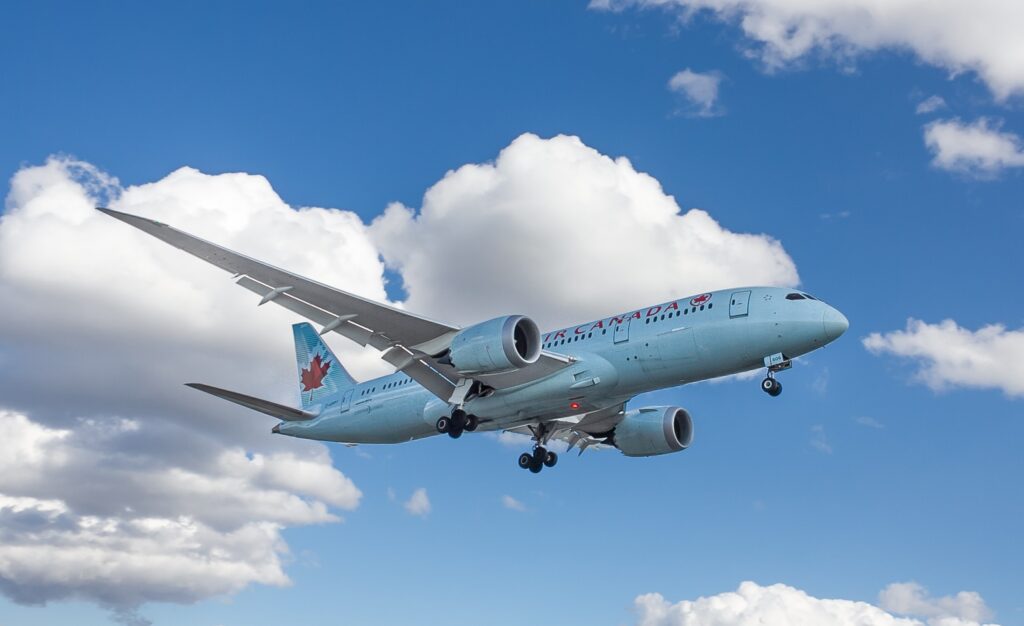
Final tips for Working Holiday Insurance for Canada ( th e small print)
Finding travel insurance for canada.
While we have used most of the companies above, it is always worth spending that little bit extra just to read the fine print.
It is important to pick the IEC travel insurance provider and policy that is right for you.
As we mentioned above, you will be with them for the next 12 to 24 months, so it is worth spending that little bit of extra time to read through everything.
Please always double-check cover details directly with your insurance policy provider, as any of the above information may change at any time.
Thank you so much for reading, and if you have any questions at all, please reach out to us!
You will also find a great selection of useful links and discounts on other services below:
Other useful links for your IEC visa:
Booking.com – This is the perfect alternative to Airbnb when you need a short place to stay.
Hostelworld – If you need a cheap place to stay where you can meet other travellers, Hostelworld is the best.
OFX – Another great money transfer company for larger transfers. We usually use them for larger sums. Follow the link for free transfers for life.
CurrencyFair – Our favourite money transfer company. They are 8x cheaper than banks. Follow the link for 10 free transfers with CurrencyFair.
Best Quote and TrueTraveller – The best travel insurance companies on the market! We personally used them both and can highly recommend them.
Taxback.com – Every time we have to do our taxes or claim Superannuation, we use these guys.
Sendmybag – The best company to ship your excess luggage to and from Australia. Follow our link for a 5% discount on your shipment.
If you need more info on moving to Canada, make sure to check out our Canada posts here .
Like what you are reading? Pin the image below!
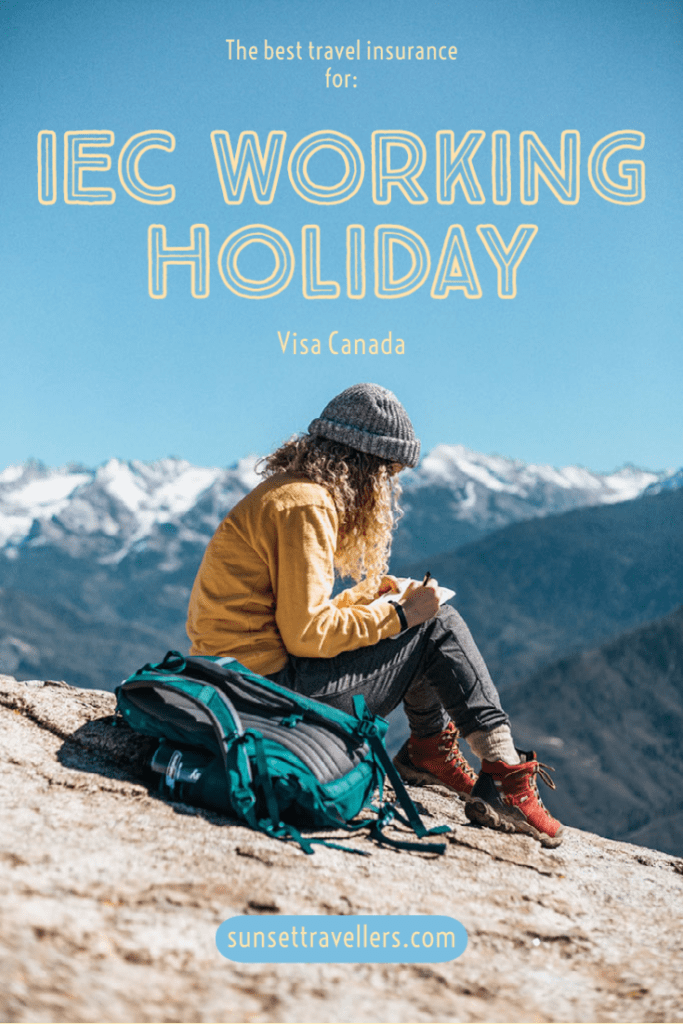
Thanks for stopping by
Steve and Sabina
Notify me of follow-up comments by email.
Notify me of new posts by email.
Sunset Travellers
Sunday 13th of October 2019
Thanks a lot for letting us know!
Gerphil Galleto
Good day! I already found a travel insurance company they said that if something happens on me at work in canada they can't cover anything that happened to me because of my work. Is this reasonable from Insurance company?
Hi Gerphil,
Travel insurance is not a health insurance. It's designed for emergencies only. Once you are in Canada you most likely will be able to get health insurance via your employer. Best of luck!

Canada Travel Insurance
Travel insurance for canada: a guide for us travelers .
From exploring Banff National Park's breathtaking landscapes to experiencing Toronto's vibrant culture or the historic sites of Quebec City, Canada offers a wide range of popular locations and activities. However, before you dive into your adventure, there's a crucial detail to address: securing your travel insurance.
Discover all the ins and outs of travel insurance for Canada in this guide. We've got you covered with details on costs, requirements, essential coverage, COVID-19 restrictions, and some handy tips for your trip.
What should your Travel insurance cover for a trip to Canada?
How does travel insurance work for canada, do i need travel insurance for canada , how much does travel insurance cost for canada .
- Travel Insurance Requirements for Canada
Are there any COVID-19 restrictions for US Visitors?
Are there any required travel vaccinations for canada , traveling with pre-existing medical conditions , our suggested axa travel protection plan .
At a minimum, your travel insurance to Canada should cover trip cancellation, trip interruption and emergency medical expenses. Regarding international travel, the US Department of State outlines key components that should be included in your travel insurance coverage. AXA Travel Protection plans are designed with these minimum recommended coverages in mind.
- Medical Coverage – The top priority is making sure your health is in order. With AXA Travel Protection, you can have access to quality healthcare during your trip overseas in the event of unexpected medical emergencies.
- Trip Cancellation & Interruptions – Assistance against unexpected trip disruptions can dampen the mood, AXA Travel Protection offers coverage against unforeseen events.
- Emergency Evacuations and Repatriation – In situations where transportation is dire, AXA Travel Protection offers provisions for emergency evacuation and repatriation.
- Coverage for Personal Belongings – AXA offers coverage for your belongings with assistance against lost or delayed baggage.
- Optional Cancel for Any Reason – For added flexibility, AXA offers optional Cancel for Any Reason coverage, allowing you to cancel your trip for non-traditional reasons. Exclusive to Platinum Plan holders.
In just a few seconds, you can get a free quote and purchase the best travel insurance for Canada.
Let’s say you’re exploring Ottawa's stunning architecture or skiing down Banff's slopes with AXA Travel Protection. If you were to fall ill or face an unexpected travel hiccup, AXA Travel Protection steps in to help support you. Whether assisting in medical transportation or finding the best alternative for a trip delay, AXA Travel Protection ensures you’re supported in your time of need.
How AXA Travel Protection Can Benefit Visitors to Canada
Here’s the entire list of benefits travelers can have access to with an AXA Travel Protection Plan:
Medical Benefits:
- Emergency Medical Expenses: Should you fall ill or have an accident during your trip, your policy may offer coverage for medical expenses, including hospital stays and doctor's fees.
- Emergency Evacuation & Repatriation: In case of a serious medical emergency, your policy may include provisions for evacuation to the nearest appropriate medical facility or repatriation.
- Non-Emergency Evacuation & Repatriation : In non-medical crises (e.g., political unrest), your policy may cover evacuation or repatriation, subject to policy terms.
Baggage Benefits:
- Luggage Delay: If the airline delays your checked baggage, your policy might offer reimbursement for essential items like clothing and toiletries.
- Lost or Stolen Luggage: In the unfortunate event of permanent loss or theft of your luggage, your policy may offer reimbursement for its value, assisting you in replacing your belongings.
Pre-Departure Travel Benefits:
- Trip Cancellation: You may be eligible for reimbursement if you cancel your trip due to a sudden illness or injury.
- COVID-19 Travel Insurance: Coverage is available for trip cancellation and medical expenses related to COVID-19, subject to policy terms and conditions.
- Trip Delay: If your flight faces delays due to unforeseen circumstances, you may have coverage for additional expenses such as meals and accommodations.
Additional Optional Travel Benefits:
- Rental Car (Collision Damage Waiver): Exclusive to Gold & Platinum plan policy holders, this optional benefit gives travelers extra coverage on their rental car against damage and theft.
- Cancel for Any Reason: Exclusive to Platinum plan policy holders; this optional benefit gives travelers more flexibility to cancel their trip for any reason outside of their standard policy.
- Loss Skier Days: Exclusive to Platinum plan policy holders, this optional benefit offers reimbursement to mitigate some costs associated with pre-paid ski tickets that you or your traveling companion cannot use due to specified slope closures.
- Loss Golf Days: Exclusive to Platinum plan policy holders, this optional benefit offers reimbursement to mitigate the expenses linked to prepaid golf arrangements that you or your travel companion are unable to utilize due to specified golf closures.
Americans aren't required to purchase domestic or international travel insurance to visit Canada. But it’s still highly recommended to have a travel insurance plan before embarking on your next trip.
Why? There are several reasons:
- Medical Emergencies: Your health is a top priority. If you face a sudden illness or injury in Canada, travel insurance offers the means to receive prompt and quality medical care.
- Lost Baggage: Airlines sometimes mishandle baggage, and the last thing you want is to be without essentials in an unfamiliar place. Travel insurance offers to cover the cost of replacing necessary items, allowing you to continue on.
- Flight Delays: Travel disruptions like flight delays can happen. If you miss a connecting flight or incur additional expenses due to delays, travel insurance can help cover the costs.
In general, travel insurance to Canada costs about 3 – 10% of your total prepaid and non-refundable trip expenses. The cost of travel insurance depends on two factors for AXA Travel Protection plans:
- Total Trip cost: The total non-prepaid and non-refundable costs you have already paid for your upcoming trip. This includes prepaid excursions, plane tickets, cruise costs, etc.
- Age: Like any other insurance type, the correlation is rooted in increased health risks associated with older individuals. It's important to note that this doesn't make travel insurance unattainable for older individuals.
With AXA Travel Protection, travelers to Canada will be offered three tiers of insurance: Silver, Gold , and Platinum . Each provides varying levels of coverage to cater to individual's preferences and travel needs.
Travel Insurance requirements for Canada
Travel insurance is not mandatory for US travelers coming to Canada, but having coverage for medical emergencies is a smart move. It's also worth checking if your visa, entry requirements, or tour operator call for extra coverage.
As of October 2023, Canada has eliminated all COVID-19 entry requirements. However, it's crucial to be mindful of your health. If you develop COVID-19 symptoms before your trip, consider postponing your travel plans to Canada. Having Cancel for Any Reason as part of your travel insurance plan becomes invaluable in such a scenario. This optional benefit provides the flexibility to cancel your trip, even for a reason beyond standard coverage.
Canada does not have specific vaccine requirements for travelers. However, due to COVID-19, travel requirements may change from time to time. Stay up-to-date on vaccine requirements and recommendations by consulting official sources such as the Government of Canada's website.
Traveling with pre-existing medical conditions can complicate your plans, but with AXA Travel Protection, we're here to support you during your trip. Our Gold and Platinum plans offer coverage for pre-existing medical conditions. The Platinum plan, in particular, is our highest-offered choice for travelers who want our highest coverage limits and optional add-ons,
What does this mean for you? If you've got a medical condition hanging around, you can qualify for coverage under our Gold and Platinum plans with a pre-existing medical condition , so long as it’s within 14 days of placing your initial trip deposit and in our 60-day look-back period. We're here to ensure you travel easily, no matter your health situation.
AXA presents travelers with three travel plans – the Silver Plan , Gold Plan , and Platinum Plan , each offering different levels of coverage to suit individual needs. Given that Canadian hospitals often do not accept U.S. health insurance or Medicare, we genuinely recommend travelers consider purchasing any of these plans, particularly for the crucial coverage they offer for emergency accident and sickness medical expenses.
The Platinum Plan is your go-to choice if you're looking for extra coverage aligned with the Canadian experience. " Cancel for Any Reason " offers greater flexibility for those unexpected twists in your travel plans and the " Rental Car (Collision Damage Waiver) " offers assistance when you're out exploring Canada's stunning landscapes in a rental car.
Additionally, part of the Platinum Plan is the " Lost Skier Days " benefit, offering potential reimbursement if ski resorts unexpectedly close due to ever-changing snow conditions. These perks make the Platinum Plan an excellent option for anyone seeking comprehensive protection during their exciting Canadian adventures.
FAQs about Canada Travel Insurance
1. can you buy travel insurance after booking a flight .
Absolutely, travelers have the option to purchase travel insurance for Canada after they've booked their flights.
It's advisable to purchase travel insurance for your trip as soon as you have made your initial trip deposit (prepaid and non-refundable trip costs.) AXA Travel Protection offers coverage as soon as you purchase your protection plan. We can give coverage against unforeseen events before you leave for your trip. Additionally, our policies offer coverage for preexisting medical conditions and Cancel for Any Reason if you purchase your protection within 14 days of making your initial trip deposit.
2. Do US citizens need travel insurance to Canada?
Travel insurance to Canada from the USA is not mandatory, but it is highly recommended. While Canada’s healthcare system is fantastic, it might not cover all your medical expenses as a non-resident and medical bills can add up fast.
3. What type of medical conditions does AXA Travel Protection cover? AXA covers three types of medical expenses:
- Emergency medical expenses
- Emergency evacuation & repatriation
- Non-medical emergency evacuation & repatriation
Emergency medical expenses are unexpected incidents that arise, such as broken bones, burns, unexpected illnesses, and allergic reactions. Emergency evacuation and repatriation can cover your immediate transportation home in the event of an accidental injury or illness. Non-medical emergency evacuation and repatriation can cover evacuation assistance when you immediately leave a destination for non-medical-related events. These could be things like natural disasters or civil unrest.
Disclaimer: It is important to note that Destination articles are for editorial purposes only and are not intended to replace the advice of a qualified professional. Specifics of travel coverage for your destination will depend on the plan selected, the date of purchase, and the state of residency. Customers are advised to carefully review the terms and conditions of their policy. Contact AXA Travel Insurance if you have any questions. AXA Assistance USA, Inc.© 2023 All Rights Reserved.
AXA already looks after millions of people around the world
With our travel insurance we can take great care of you too
Get AXA Travel Insurance and travel worry free!

Travel Assistance Wherever, Whenever
Speak with one of our licensed representatives or our 24/7 multilingual insurance advisors to find the coverage you need for your next trip.
Our partner, Cigna, offers newcomers peace of mind. Get a free quote !
Find the best immigration program for you. Take our free immigration quiz and we’ll tell you the best immigration programs for you!
How To Choose The Best Travel Insurance For Canada

By Hugo O'Doherty
Updated 7 days ago
Find the best immigration programs for you
Advertisement
Rate article
Share article, whether you're planning a temporary visit or temporary move (with a temporary work permit), there are many companies offering travel insurance for canada -- and health insurance as well. but which policy will meet your needs.
Not all travel insurance or health insurance policies are created equal for your stay in Canada. Your plans will dramatically impact the type of coverage you need, so you will need to consider the following (amongst other factors):
- The length of your stay.
- Which provinces and territories you plan to visit.
- Your age and health status.
- Your planned activities while you stay (snow sports and other adventure sports may require specific coverage).
- Any supplementary coverage you might need.
- Whether you need specific insurance to receive your work permit .
It’s important that you find coverage that’s tailored, meets your needs, and is affordable.
What you'll find on this page

Start your IEC working holiday with a free Moving2Canada account

Do you have IEC health insurance?
What’s the difference between travel insurance for canada vs. health insurance.
Health insurance is designed specifically to cover medical expenses. Travel insurance can cover a range of different costs, which may include things like trip cancellation, lost luggage, medical costs, and repatriation. Notably, some travel insurance packages actually include health insurance coverage, so you may not need to buy them separately.
Health Insurance for Permanent Residents in Canada
If you are moving to Canada through a permanent residence program, you may eventually enjoy publicly-funded healthcare in Canada — but you won’t be covered for the first few months after landing. The reason for this is that it often takes a few months for your provincial or territorial health coverage to kick in. This means that you should consider health insurance for these first months in case of any emergencies.
Health Insurance for Temporary Residents in Canada
While you may get coverage in the province or territory you settle in, you may also need to wait several months for the coverage to kick in if you are moving to Canada on a study permit or on a work permit (with some exceptions, see below). It’s important for you and your family, if applicable, to get quality health insurance for those early months, both Cigna Global and BestQuote are leaders in these policies. Get a quote from Cigna and a quote from BestQuote to begin comparing your options!
IEC Work Permit
If you’re participating in the IEC Working Holiday Visa in Canada program, you are required to have health insurance that covers the full duration of your work permit and insurance that will cover repatriation costs. Oftentimes, you can purchase a package for travel insurance for Canada which will cover all IEC requirements, including for health insurance.
You need this insurance even if you become eligible for provincial healthcare and medical cover from your employment in due course.
We always recommend beginning with BestQuote as they will offer you a comparison of rates for many different options on the market. Get your free quote from BestQuote today !
Quick note: British Columbia and Alberta are world-famous for skiing and snowboarding. If you want to hit the slopes, make certain your Canadian travel insurance policy contains coverage for any potential injuries.
Where will you be buying your travel insurance or health insurance for Canada?
Select the region you’ll be in when you’re buying your travel insurance for Canada, or your health insurance.
BestQuote Travel Insurance
A full service Canadian travel insurance broker offering the widest selection of travel insurance plans for visitors to Canada. Available plans may include health coverage, coverage for up to 24 months, and coverage related to pre-existing medical conditions. Plans are available before or after leaving home. Get your quote from BestQuote today !
True Traveller
For years True Traveller has been a popular option for Europeans seeking mandatory insurance for International Experience Canada (IEC) including the Working Holiday program. True Traveller’s IEC insurance includes medical care, hospitalization, and repatriation which exceeds IRCC’s requirements. Get your quote from True Traveller today !
BestQuote Travel Insurance A full service Canadian travel insurance broker offering the widest selection of travel insurance plans for visitors to Canada. Available plans may include health coverage, coverage for up to 24 months, and coverage related to pre-existing medical conditions. Plans are available before or after leaving home. Get your quote from BestQuote today !
Fast Cover Travel Insurance The company of choice for Australian IEC participants seeking travel insurance for Canada. Options for 12 and 24 months, and a range of products from medical only to comprehensive, snow sports, and adventure activities. Duo policies, for couples or two friends travelling together, get 5% off. Get a quote from Fast Cover .
New Zealand
Rest of the world (including canada), canadian health insurance.
Permanent residence applicants can consider more comprehensive health insurance policies, above typical plans for travel insurance for Canada.
Expatriate health insurance ensures access to the best possible healthcare while living and working abroad. Cigna Global is a leader in these policies and provides 12-month cover for those moving to Canada, regardless of nationality or age.
Click here to get a free online quote, which should take less than 60 seconds to complete.
Why IEC work permit holders need health insurance (and may want travel insurance for Canada)
1. It’s mandatory for IEC work permits.
Every year, we hear countless stories from people who aren’t issued with an IEC work permit because they didn’t buy Canadian health insurance. The rules clearly state that you must have insurance for the full duration of your work permit (e.g. two years).
2. You can’t buy a short policy, and then extend it later.
Again, the rules are clear: you can’t buy a three-month policy and agree to extend it to a two-year policy just to appease the immigration officer.
For example, if you only buy health insurance on a three-month or six-month policy, then the immigration officer is within their rights to issue only a three-month or six-month visa. This cannot be extended at a later date.
3. Provincial insurance doesn’t give the coverage you need.
Provincial insurance that’s on offer is not accepted as adequate by federal immigration officers. This is because it will not cover repatriation costs, i.e. flying you to your home country in the event of death.
Other costs not included in provincial cover included: dental accidents, ambulance, medications, medical devices like casts and crutches, and trips to the US and Mexico. BestQuote has these options and will enable you to compare rates from many different insurance providers. Get your quote from BestQuote today !
4. Nobody likes paying for insurance, but the alternative could be a lot worse.
You buy insurance in case the worst happens. Often, we feel it’s a waste if that big event does not happen. As an adult, we encourage you to be responsible, as your family would not appreciate a $20,000 hospital bill in the event of serious injury or death and your repatriation home.
Where to next?
- Get your Canadian adventure off to the best start! Download our free Getting Started Guide magazine .
- Learn how to shop around: see our 7 easy questions to ask your travel insurance provider article.
- Find work in construction and engineering. Visit our Outpost Recruitment agency .
Related Content
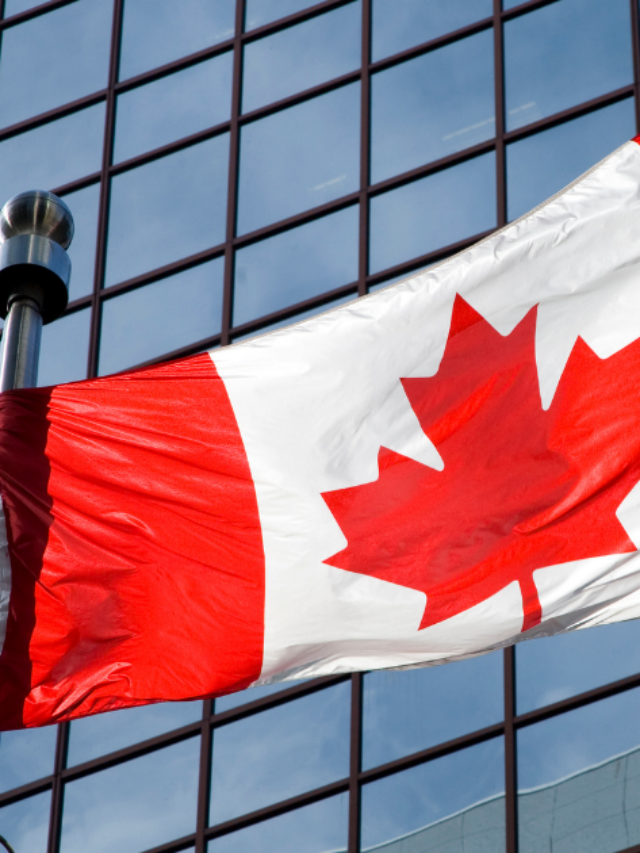
Express Entry Draw Weekly Recap – April 22 to 26, 2024

Latest IEC Working Holiday Canada News

Canada changes travel requirements for Mexican citizens

Latest Express Entry Draws Results
About the author.

Hugo O'Doherty

Get immigration help you can trust
Book a consultation with one of Moving2Canada's recommended Canadian immigration consultants. You deserve the best in the business.

Get the latest news & updates
Sign up for the Moving2Canada newsletter to get the latest immigration news and other updates to help you succeed in Canada.
Popular Topics
Search results
results for “ ”
Immigration
Learn everything you need to know about Canadian immigration
If you need help with your immigration, one of our recommended immigration consultant partners can help.
Calculate your estimated CRS score and find out if you're in the competitive range for Express Entry.

Take the quiz

Your guide to becoming a student in Canada
Take our quiz and find out what are the top programs for you.

Watch on YouTube
This guide will help you choose the best bank in Canada for your needs.

Get your guide
News & Features
latest articles

Our Partners
Privacy overview.

- " id="mainPhoneNumber">
- Annual Travel Insurance
- Cruise Travel Insurance
- Family Travel Insurance
- Seniors Travel Insurance
- Ski Travel Insurance
- Budget Direct
- Fast Cover Travel Insurance
- Insure4Less
- InsureandGo
- Simply Travel Insurance
- Ski-Insurance
- Travel Insurance Saver
- Travel Insuranz
- Wise Traveller
- Zoom Travel Insurance
- See more companies...
- Travel Insurance Tips
- Covid-19 Help
- Read Reviews
- Write a Review
Travel Insurance Quotes

Please Note - If you are cruising around Australia you need to select Pacific. With Regions, variances can apply for Bali, Indonesia, Japan and Middle East. You are not required to enter stop-over countries if your stop-over is less than 48 hours.
If you don’t know where you’re traveling to within the next 12 months, choose Worldwide to ensure you’re covered no matter where you go. If you’re travelling to multiple countries choose the region that you are visiting that is furthest away (excluding stopovers less than 48 hours). In most cases you will be covered for the closer regions as well. For example, if you choose Europe, you will also be covered in the Middle East, Asia and Pacific.
Worldwide means anywhere in the world
Americas means USA, Canada, South America, Latin America, Hawaii and the Caribbean
Europe means all European countries, including UK
Middle East refers to the area from Syria to Yemen; Egypt to Iran
Asia generally means Asia and the Indian subcontinent. For some insurers this excludes Japan*
Pacific means the South West Pacific, Australia and Indonesia/Bali*. Select Pacific for domestic cruises in New Zealand waters
New Zealand means domestic travel within New Zealand only
*Note: Variances apply for Bali, Indonesia, Japan and Middle East. Check that your destination is covered once directed to your chosen insurer’s site.

We compare quotes from over 25 travel insurance brands in Australia. Do your comparison online to save time, worry and loads of money.
WHY AUSSIES LOVE COMPARE TRAVEL INSURANCE

No Hidden Fees
Travel agents and airlines charge huge commissions. We don’t! Our travel insurance comparison is free to use. You'll be directed to the insurer's website to buy travel insurance without any sneaky charges.

Great Prices
Whether you're looking for cheap travel insurance or fully comprehensive cover for a domestic or international trip, you'll find the prices on our site are the same great prices you get buying travel insurance direct !

Data Protection
We promise to keep your data secure and not to sell your information to other companies. And we only ever send you relevant emails you have subscribed to.

Using our comparison is easy-peasy! One simple form makes it quick and easy to compare travel insurance quotes for your holiday. You'll get quotes online for your trip in seconds.

Rest Assured
All the policies we compare have 24/7 overseas emergency assistance to help in time of need. All brands are underwritten by reputable insurers like Allianz Australia Insurance Limited, Auto & General, Chubb, Great Lakes, Lloyds, QBE & more!

Product Choice
We compare heaps of policies for all types of travellers from some of Australia’s most reputable travel insurers. We compare 25+ insurance brands including, 1Cover, Amex, Budget Direct, Insure and Go, Virgin Money, Zoom & more!

Travel Insurance Extraordinaire At Your Service
Need some help? Use the search box below to find answers to all those tricky questions. We’ve got heaps of expert travel insurance tips to help you get the best policy for your upcoming holiday!
Why Buy Travel Insurance?
We’re not silly, we know that plenty of Aussies go on holiday and have an amazing time exploring new and exciting places without buying travel insurance. But taking a gamble on your much-needed break can be risky. Here’s why!
Exxy Medical Costs
If you buy a policy for just one reason, this is it! Falling ill or being injured while travelling overseas can be extremely costly. Hospital costs in the USA can reach up to $10,000 per day, while emergency transport home for treatment can easily exceed $100,000! Ouch!
Disasters Can Strike
The excitement of getting on that plane has you knotted up like a pretzel. Picture your dismay if you had to cancel last minute. Worse still, imagine you’re mid-martini when bad news breaks. Should you need to return home, you’ll be covered for unforeseen events like injury or illness of a close relative.
Your Stuff Is Important
Loss, theft or damage to your prized possessions can be a common, yet gut-wrenching experience. If your personal belongings go AWOL while you’re away the right policy will pay to replace or repair them. Win!
Peace Of Mind
Because you have to.
Still not convinced? We hate to be the fun police, but some countries simply won’t let you in without cover! For example, it is mandatory to take out travel insurance when travelling to Thailand or Cuba.

Trending TRIP COVER Tips And Guides

ultimate guide to travel insurance
Travel insurance is two words that could make all the difference to your holiday. Get the lowdown on how to choose the right travel insurance policy and the potential traps.

Pre-existing medical conditions
Having pre-existing medical conditions doesn't mean you can't get cover or that it has to be expensive. It simply means that you need to dig a little deeper when doing your research.

CORONAvIRUS & travel insurance
The rapid spread of covid-19 around the globe has thrown international travel into chaos. Find out what's covered if you're travelling during the coronavirus outbreak.

TRAVEL INSURANCE REVIEWS
Not sure which policy to pick? Our travel insurance reviews are here to help! Thousands of Aussies have reviewed their travel insurers to give you the inside story on everything from claims handling to customer experience.
Or perhaps you want to have your say? Whether you love or loathe your travel insurer rate and review them to help other Aussies pick the right policy for their holiday.
Travel Insurance Frequently Asked Questions
Does travel insurance cover coronavirus (covid-19).
It depends! Unfortunately, the answer isn't a straightforward one. There are some situations where cover is available, and others where it is an exclusion. It largely depends on which insurer you bought your policy with ; when you bought it; where you're travelling to; when you're travelling; and, the reason for your claim. As travel continues to open up around the world, most (but not all) insurers provide cover for overseas hospital & medical expenses if someone named on the policy was positively diagnosed with COVID-19. Some insurers also provide cover for additional expenses and cancellation benefits.
Which is the best travel insurance in Australia?
The best travel insurance depends entirely on your planned trip and your circumstances. If you're a backpacker on a strict budget, you might want a no-frills medical-only policy, while if you've paid a lot in deposits or if you have pre-existing health conditions, a more comprehensive policy might be best for you. While there's no single best travel insurance that's right for everyone, finding a policy that works for you is easy when you use our quote comparison to start comparing prices and features. With Compare Travel Insurance, you can also read up on travel insurance reviews from customers to learn about their customer service and importantly claims experience.
What does comprehensive travel insurance cover?
Comprehensive travel insurance includes coverage for unexpected medical expenses overseas in the event of injury or illness, as well as cover if your luggage is lost or stolen, cancellation and disruption benefits if you need to cancel or are delayed for unforeseen reasons, as well as public liability cover. Go to our comprehensive travel insurance guide to learn more.
What do medical-only policies cover?
Medical-only trip insurance a.k.a basic policies generally only offer coverage for unexpected medical expenses overseas. Some basic policies also include a small amount of coverage for luggage or cancellations. Our website allows you to filter quotes for basic, mid-range and comprehensive travel insurance policies and their features to help you find the policy which is right for you.
Is it too late to buy travel cover?
Although we recommend buying a policy as soon as you've started paying deposits for flights, accommodation and tours, you can buy travel insurance at any point, even if you are already overseas . Exclusions often apply though, so be sure to check the PDS before you buy.
Can I purchase travel insurance at the airport?
Yes, you can. Generally speaking, you can purchase travel insurance up to a year before your trip, right up to boarding at the airport. With comprehensive travel insurance, you are covered for cancellation benefits from the moment you buy your policy, so we recommend buying it as soon as you start paying for flights, tours and accommodation.
Can I get travel insurance if I'm already overseas?
You can buy cover if you are already overseas, although each travel insurer has different rules on age limits and waiting periods. Check out our already overseas travel insurance guide to learn more.
Does travel insurance cover pregnancy?
You can buy travel insurance to cover you when you're pregnant, but every brand has different rules depending on how many weeks gestation you are, whether you've had complications, and whether you're looking for cover in case of emergency birth. Check out the handy table on our pregnancy guide for more information.
Do I need cover in Australia?
If you're an Australian resident, a domestic policy covers you for cancellations, luggage cover and often rental vehicle excess, but as you're covered by Medicare, medical coverage is not included. International visitors to Australia are currently not required to have travel insurance by law, but it is highly recommended to protect you from eye-watering medical bills and more.
Which is the cheapest policy?
The cost of travel insurance depends on a range of factors including your destination, duration of travel, age of travellers, planned activities, whether or not you have any medical conditions and the type of cover you choose (medical only, mid-range or comprehensive). The cheapest travel insurance is generally to less risky parts of the world - places with cheaper healthcare and less risk of injury, illness or theft - and policies which offer less coverage - so ones without benefits for adventure activities or pre-existing conditions. To get cheap travel insurance from Australia for your trip, create a quote and compare prices, but remember that the cheapest isn't always the best. You should consider your trip and what you require cover for.
Why should I buy travel insurance direct online?
Comparing prices and features online makes it easier to find the policy that's right for you and your circumstances. With comparetravelinsurance.com.au , the price you see is the same price direct from the insurer. Sometimes you're not after the best policy but rather the best bang for your buck and comparing prices and features online can save you time, worry and loads of money.
Our Travel Insurance Comparision Helps You
Save time, worry and loads of money.
Stay up to date with our latest news, deals and special offers.
Your privacy is important to us.

Comparetravelinsurance.com.au is Australia’s leading comparison site solely focused on travel insurance.
Our comparison is a free service that allows users to compare quotes in a few simple steps based on limited personal criteria. Comparisons supplied are not a recommendation or opinion about the suitability of a policy for a user. Comparisons are default ranked according to price and users have the ability to sort by popular cover levels. Whilst we compare a vast range of policies, we do not compare all providers in the market. This site compares the following brands: 1Cover, AllClear, Budget Direct, Downunder, Fast Cover Travel Insurance, Insure4Less, InsureandGo, iTrek, Simply Travel Insurance, Ski-Insurance, Travel Insurance Saver, Travel Insuranz, Wise Traveller, Zoom Travel Insurance . The directors and shareholders are common with companies i-Trek Pty Ltd, Zoom Travel Insurance and 1Cover Pty Ltd including it’s subsidiary brand Ski-insurance. CoverDirect takes all reasonable care when preparing this information but does not warrant its accuracy. Pricing information is supplied by the providers who participate on this site and should be verified with the insurer before you purchase. This site links users to the website of the provider to verify quotes and access the relevant PDS to understand what is, and is not, covered by a policy prior to purchase.
CoverDirect Pty Ltd owns and operates this website under AFS Licence 383590. Located at Level 12, 338 Pitt Street, Sydney, NSW 2000 Australia.
For further information view our FSG and Terms of Use . Contact us by calling 1300 659 411.
Loading Quotes...

Please login or register to continue. It'll only take a minute.

Login with Facebook
Login with Google

- There was an error logging in, please try again.
Enter your email and password
- There was an error on your registration, please try again.
Don't you have an account?
Just checking you are a human


Search Smartraveller
Choice travel insurance buying guide.

Do you need travel insurance? How do you choose the right cover? What are you covered for?
CHOICE answers all the questions you need to know before leaving the country.
Download the CHOICE travel insurance buying guide [PDF 3.52MB] Download the CHOICE travel insurance cheat sheet [PDF 587KB] Who is CHOICE? Set up by consumers for consumers, CHOICE is the independent consumer advocate that provides Australians with information and advice, free from commercial bias. Visit choice.com.au .
Why travel insurance?
- Does travel insurance cover COVID-19?
How to get travel insurance
Before you buy, how to save money on travel insurance.
- How to read the product disclosure statement
What are you covered for?
- Credit card insurance
How to make a complaint
If you’re leaving Australia, travel insurance is just as essential as a passport.
Holidays don’t always go as planned.
If you’re leaving Australia, travel insurance is just as essential as a passport. Medical expenses are the number one reason to get insurance, but sometimes other things can go wrong, such as trip cancellations, delays, lost luggage or even the big stuff like natural disasters and pandemics. If you end up out of pocket because of these things, insurance can make up for that.
The Australian Government won’t pay your medical bills.
In an emergency, the Australian Government can only help so much. The Consular Services Charter describes what the government can and can’t do to help Australians overseas.
If you end up injured or sick while overseas, you’ll be footing the hospital bill and the cost of flying home. If you’re really unlucky, that could cost you or your family hundreds of thousands of dollars.
68% of travellers mistakenly believe the Australian Government would ensure they get medical treatment if they need it overseas, and 43% believe the government would pay their medical bills.
Some countries won’t let you in if you don’t have insurance.
Singapore and the UAE require you to have travel insurance. Not to mention all 26 European countries in the Schengen Area if you’re applying for a visa to visit. Read the Smartraveller travel advice for information about your destination.
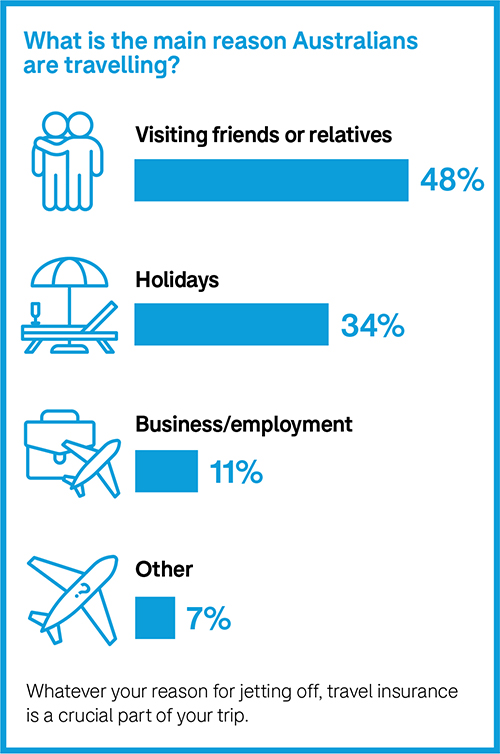
Reciprocal healthcare Australia has reciprocal healthcare agreements with several countries: Belgium, Finland, Italy, Malta, the Netherlands, New Zealand, Norway, the Republic of Ireland, Slovenia, Sweden and the United Kingdom. If you have Medicare, you can get subsidised treatment for essential services only in these countries, which often leads people to ask whether they still need travel insurance. The answer is yes, for the following reasons. You’re usually only covered for urgent care that can’t wait until you get home. If you’re very ill, travel insurance can pay for a medical escort to bring you home to Australia. You still may have to pay fees for treatment and medication. For example, in New Zealand reciprocal health care doesn’t cover you for free or subsidised care by a general practitioner or ambulance. Travel insurance can cover you for cancellations, delays, stolen items and more.
Remember to take your Medicare card with you. You’ll need it, along with your passport, to prove you’re eligible for reciprocal health care. For more information, visit servicesaustralia.gov.au .
Marco* had breathing difficulties on his way home from Europe, causing his flight to be diverted to the UAE. Hospitals in the UAE won’t admit you unless you have insurance or can pay an upfront fee. Marco’s family had to pay thousands of dollars for his treatment. *To protect privacy we have changed names and some details
Do you need domestic travel insurance?
Most of us already have medical cover at home, be it Medicare or private health insurance or both. But there are still a few key reasons to consider domestic travel insurance.
- Cancellation: If you’ve spent a lot on your holiday, then it’s not too much extra to buy travel insurance in case of the unforeseen.
- Baggage cover: If you’re travelling with valuables, think about whether you want them covered for theft, loss or damage.
- Car hire excess: You can save money using travel insurance to cover your collision damage excess, rather than paying the car hire company’s extra charge.
Does international travel insurance cover COVID-19?
Many travel insurers now offer limited cover for COVID-19, but the available cover varies quite a lot. Some policies only cover medical and repatriation costs if you get COVID-19 overseas, while other policies provide limited cover for cancellation costs in addition to medical and repatriation costs.
You should always check the details of your insurance coverage, particularly how it applies to COVID-19 and travel disruptions.
Over 90% of travellers will look for insurance that covers them for cancellation and medical expenses caused by COVID-19.
If you’re planning to go on a cruise, be extra careful. Some travel insurers may not offer COVID-19 cover for multi-night cruises or they may restrict the cover provided on cruises.
Also, don’t rely on the travel insurance on your credit card unless you check it closely – it may not cover claims related to COVID-19.
There are cooling-off periods for COVID-19 cancellation cover, so it’s best to buy your travel insurance at the same time as you book your trip. Some insurers may only cover cancellation if you test positive to COVID-19 and the policy was purchased more than 21 days before your scheduled departure date.
Make your travel plans COVID-safe
You need to be prepared for your travel plans to be interrupted at short notice. As travel insurance may not protect you from government border closures, general lockdowns or quarantine requirements in your destination country, the key is to book only with providers that allow you flexibility should things change.
- Check the rules for travelling to your destination. For example, are there any entry requirements? What are the vaccination requirements? And what type of travel insurance do you need?
- Read the terms and conditions of your airline, accommodation and travel tours before you book. Will they refund you if you can’t travel due to COVID-19? If they only offer a reschedule or a credit, will you be in a position to redeem the credit in future?
- You can book flexible tickets for flights but be aware you usually have to pay the difference between the prices for the tickets you bought and the new tickets. So changing your flight dates at short notice can be very expensive.
- If you book through a travel agent or booking site, what are their terms and conditions? Will they refund you or provide a credit? Are there cancellation fees?
- If you pay by credit or debit card (and you selected ‘credit’ when you paid), you may have access to credit card chargebacks if something goes wrong.
- Keep on top of the latest travel advice and requirements at smartraveller.gov.au . Travel restrictions can change at short notice.
- If you do have to cancel, your travel insurer will ask you to claim what you can back from travel providers first. Read the CHOICE advice on how to get your money back on travel cancellations and ask your travel insurer if you can get a refund or partial refund of your travel insurance premium.
You can buy travel insurance from a travel insurer, travel agent, insurance broker, credit card provider, or even from your health, home or car insurer.
You can buy travel insurance online (direct from the insurer’s website, from a comparison site or through an airline booking site), over the counter or over the phone.
Buy travel insurance as soon as you know your travel dates. That way you’re covered if your trip is cancelled before you even leave or if you’re unable to travel at all.
You can certainly buy travel insurance quicker than it will take you to read this guide, but do you know what you’ll be covered for? Will you be covered if you trip over after having a drink? If you crash your scooter in Thailand? If you lose your wallet during a stopover? If you need to isolate because you contract COVID-19?
There are a lot of ‘what ifs’ to consider, depending on where you’re going and what you’ll be doing, so it’s worth reading the product disclosure statement (PDS) first to make sure you’ll be covered.
Will you use it? Hopefully not, but research by Smartraveller found that one in 4 Australian travellers experienced an insurable event on their last overseas trip. Most common insurable events Flight or tour cancelled Flight delayed more than 12 hours Received medical treatment Lost, damaged or stolen luggage Missed a connecting flight Lost, damaged or stolen cash or personal items Forced to cancel trip before departure What if the insurers don’t pay out? Australian travellers lodged almost 300,000 insurance claims in 2018–19, the last financial year before COVID-19 travel bans. Almost 90% of those were paid out. Top four reasons for declined claims Due to policy exclusions, or not included in the policy conditions Claim amount was below the excess Claim was due to a pre-existing medical condition Claim was for an item that was stolen while it was unattended
1. Where are you going?

The level of cover and the cost of travel insurance can vary depending on the region you’re travelling to, and some risks may be of greater concern than others. Not all travel insurance policies cover COVID-19 and other pandemics or epidemics such as SARS. And not all policies cover you for changing your plans due to a riot or civil commotion, for example. Travel insurance also may not be available for countries with travel alerts.
- Look up your destination on smartraveller.gov.au and make sure you’re aware of any risks or safety advice.
- Buy a policy that covers you for every country you’re travelling to or transiting through. If you’re going to Europe via a one-night stopover in the US, then get cover for the US and Europe. Usually a worldwide policy will cover this.
86% of travellers say they’re more cautious after the COVID-19 pandemic about travelling to places where it could prove harder to return home in a crisis.
You need different cover for different regions
Insurers sometimes apply policies to regions rather than having a policy for each destination.
Asia Pacific: Destinations such as New Zealand, Bali, Fiji and Papua New Guinea.
Asia: Destinations such as India, Indonesia, Thailand, Singapore and Malaysia.
Europe: Destinations such as the United Kingdom, Ireland and Western Europe.
Worldwide: All of the above as well as regions such as North America, South America, Japan and Africa.
These definitions differ for each insurer. For example, several insurers cover travel to Bali under their Pacific policy, while some will only cover travel to Bali under their Asian region policy.
2. How long are you going for?

Just a quick trip? Simply buy a standalone travel insurance policy for a set number of days.
Travel often? Consider an annual multi-trip policy or a credit card with complimentary travel insurance, but make sure it gives you the cover you need.
Tip: Annual multi-trip policies and credit card policies can restrict the length of each trip you take – anywhere from 15 to 365 days depending on your policy. Some allow you to pay for extra days.
3. What are you going to do there?

Cruising the open road on a moped? Carving up the ski slopes? Partying at a wedding? These things aren’t necessarily included in a travel insurance policy.
Scan the insurer’s list of included activities and those that you’ll have to pay extra for. And take it easy on the grog – if your alcohol or drug intake is the cause of an adverse event, it won’t be covered by your policy.
4. Are you taking any valuable items?

Do you need cover for a digital SLR camera or an expensive tablet or laptop? Cover for such valuables can vary from a few hundred dollars to thousands, and higher cover will often mean a higher premium.
Consider adding cover for portable valuables to your home insurance policy instead, but check on the excess and if the policy will cover you worldwide and not just in Australia.
Policies also vary when it comes to how they cover valuable items. Valuables in your check-in luggage often aren’t covered, while cover for baggage stored in your hire car is inconsistent. And baggage left unattended is never covered, which can include a bag that is stolen from the seat beside you in a restaurant while you’re looking the other way.
Make sure you have receipts for your valuables as travel insurance will not pay if you can’t prove you own them.
5. Do you have any medical conditions?

If you have a medical condition that existed before you bought your policy, it may not be covered. This can range from something as common as allergies or asthma through to diabetes, heart conditions and knee replacements.
If you’re not sure, the best thing to do is contact the insurer to ask whether they’ll cover your condition automatically or whether you need to do an assessment.
The Massoud family* was holidaying in Singapore when 13-year-old Nazreen had a recurrence of severe bronchitis, which had affected her in Australia before their trip. The family’s travel insurer refused to pay any hospital bills as Nazreen’s bronchitis was a pre-existing medical condition. As a result, the Massouds had to ask their friends to transfer the $17,000 they needed to cover Nazreen’s hospital expenses, additional accommodation and the cost of changing flights. *To protect privacy we have changed names and some details
It’s important to compare policies for cost and cover. Some travel insurance premiums increased by as much as 30% between March and June 2022.
Three-quarters (77%) of travellers are willing to pay more for insurance that covers pandemic-related claims.
The further out from your departure date that you buy travel insurance, the more you’re likely to pay for it, but you’ll be covered from the moment you buy your policy. For example, if you buy insurance 2 months before you fly, you effectively have cheap cover for any events that affect your travel plans in those 2 months.
If you pay for your trip in full 6 months in advance, but you only buy an insurance policy 2 weeks before you depart, you may not be covered for any cancellation costs if you contract COVID-19.
Left it until the last minute, or even later? Only a few insurers let you buy insurance once you’re already overseas (look for the ‘Have you already left Australia?’ checkbox when viewing policy options).
While not all policies offer online discounts, plenty do. Make sure you understand the policy and what it covers. Sometimes (but not always) a reduced price may mean reduced cover.
Tip: Check asic.gov.au/afslicensing to find out whether the agent has an Australian financial services (AFS) licence or is an authorised representative of a licence holder. Take the usual precautions when giving your credit card and other details over the internet.
Member discounts
Does your health, car or home insurance provider also sell travel insurance? Some companies give 10–15% discounts to existing members.
Shop around
Trying to negotiate with a website will probably get you nowhere, but if you’re buying over the phone or through a travel agent, give it a go. Travel agents pocket a commission when they sell you insurance, so if you find a better deal elsewhere, ask them if they can beat it.
Almost two-thirds (62%) of overseas travellers who buy insurance do so on or before the day of booking travel.
Use your credit card
Some credit cards come with ‘free’ travel insurance when you use them to buy a ticket, pay for other travel expenses or otherwise activate it (we say ‘free’ because you’ll pay a premium in fees for the card itself).
This type of insurance can sometimes be a money-saver, and the level of cover can be just as good or even better than standard insurance, but make sure it gives you the cover you need.
Compromise on cover
While good medical cover is always essential, you could save money on your premium by choosing a policy with lower or variable cover for cancellation, delays and lost baggage, especially if you aren’t spending big on your holiday or taking expensive items with you.
Have you read the Product Disclosure Statement (PDS)? According to research conducted in 2022, of those who bought travel insurance: 45% have skim-read the PDS 43% have read the PDS in detail 8% have left the PDS to another person on the policy to read 2% have not and will not read the PDS 2% don’t know
About that fine print
You’re about to click ‘buy’, so you may as well just tick this ‘I acknowledge I’ve read the product disclosure statement’ checkbox and bon voyage…
But wait – have you checked the fine print? In the insurance world, that ‘fine print’ is contained in the product disclosure statement, or PDS (that thing you said you’d read).
How to read the PDS
There are hundreds of policies out there and if you tried to read all the paperwork that comes with each policy, you’d have to extend your holiday just to recover.
If you don’t have time to read the whole PDS cover to cover, at least look for the following.
- The table of benefits is an overall summary of your cover.
- The policy cover section is essential reading and is generally split into ‘what we will pay for’ and ‘what we won’t pay for’.
- General exclusions are also essential reading – these are events that aren’t covered by any section of the policy.
- Pre-existing conditions can remind you of forgotten ailments and are essential reading for anyone with any kind of medical condition, no matter how mild.
- The word definition table might contain a few surprises – it’s a good place to check on the definition of a ‘relative’ or a ‘moped’, for example.
- The claims section lists some further pointers to be aware of (e.g. it’s a good idea not to admit fault or liability in the case of an accident) and the paperwork you may need to collect while you’re away if you need to make a claim, such as police reports.
- COVID-19 cover section – many policies have a special section listing medical, cancellation and other cover available for COVID-19.
- The 24-hour emergency assistance contact number (write it down and keep it handy).
The Weaver* family was relieved to have travel insurance when they needed to cancel their holiday. The family wanted to go skiing in New Zealand, but a few days before they were due to depart, 12-year-old Ruby had cold symptoms. A COVID-19 test showed she was positive. Ruby and her whole family had to isolate and their travel insurance paid their cancellation costs. *This is a fictitious but realistic example
The list of travel insurance disputes taken to the Australian Financial Complaints Authority (AFCA) reveals a battlefield of unread or misinterpreted terms and conditions. Between 1 July 2020 and 30 June 2021, AFCA received more than 2,000 travel insurance complaints related to COVID-19.
Not all travel insurance policies are the same, and the wrong policy can be almost as bad as none at all.
Peter* and his business partner had booked a business trip to South Korea and Japan from 21 February 2020 to 2 March 2020. On 20 February, Peter cancelled the trip on advice of his GP who said that due to the uncertainty of the extent of the COVID-19 outbreak, he should postpone the trip until it is safe to travel. Peter’s travel insurer denied his claim, saying the policy does not provide cover for cancellation due to medical advice. Peter made a complaint and AFCA ruled in his favour as COVID-19 had been publicly announced as an epidemic prior to Peter cancelling the trip and the doctor’s advice not to travel was prudent and reasonable. *To protect privacy we have changed names and some details
Checklist – Are you covered for COVID-19? Are your medical costs covered if you contract COVID-19? Are your extra expenses such as accommodation covered if you can’t travel or your stay gets extended because you or your travelling companion tests positive to COVID-19? What happens if you were going to stay with someone but they’ve contracted COVID-19? Or your accommodation or tour company gets closed down because of COVID-19? Are your additional expenses covered? If the Smartraveller alert level is raised to ‘Reconsider your need to travel’ or ‘Do not travel’ due to a COVID-19 outbreak at your destination after you took out travel insurance, are you covered if you cancel your trip? Are your cancellation costs covered if you can’t travel or can’t return on your booked flights because you or your travelling companion contracted COVID-19? Are you covered for cancellation costs if your business partner or a relative back home gets sick with COVID-19 and you need to return earlier than planned? If you’re planning to go on a cruise, be extra careful. Some travel insurers may not offer COVID-19 cover for multi-night cruises. Are you covered for claims caused by government travel bans, border closures, or mandatory quarantine or self-isolation requirements at your destination?
And what are the catches?
Cancellations, baggage and personal items, sports and activities.
This is the number one reason to buy international travel insurance. Look for the insurer’s benefits table, usually on the quotes screen online or near the front of their PDS, for a quick overview of what they’re offering. Most policies have an ‘unlimited’ sum insured.
Pre-existing conditions
Some insurers don’t cover pre-existing conditions at all. Some will only cover pre-existing conditions with an extra fee and sometimes a medical assessment. Some automatically cover pre-existing conditions listed in their PDS, although few will cover mental illnesses such as depression or anxiety.
Insurers exclude cover for certain pre-existing medical conditions and generally don’t provide cover for any illnesses or incidents that arise from these. This includes terminal illness or any illness that shortens your life expectancy as well as organ transplants.
Minor pre-existing medical conditions such as asthma, hypertension, diabetes, epilepsy, osteopenia and more are usually covered if:
the condition has been stable for more than 12 months
there is no planned surgery
you have not received treatment in the past 12 months.
Pre-existing condition spoiling your holiday plans? findaninsurer.com.au lists insurers that may provide cover for pre-existing conditions. Still having trouble finding cover? Enlist the help of an insurance broker.
Examples of conditions that usually need to be assessed before getting cover are coronary problems, lung disease, epilepsy, stroke or any surgeries in the last 2 years.
If in doubt, declare your condition to your insurer.
A disability shouldn’t prevent you from buying travel insurance, but it might make finding a good policy trickier and more expensive.
Is a disability a pre-existing condition?
It depends on the disability and the insurer. Many insurers will automatically cover travellers with limited mobility, cognitive impairments or vision/hearing impairments. But in some cases, this cover may come at an extra cost.
Check with the insurer, as some conditions will need to be assessed on a case-by-case basis.
Having trouble getting cover?
Under the Disability Discrimination Act, insurers must assess the actual risks, rather than make assumptions about disabilities. If you’re having trouble getting insurance, a letter from a medical professional might help, particularly if they can state that you’re not likely to need medical or hospital treatment while on your trip.
Cover for your equipment
If you’re travelling with a wheelchair, mobility aid or hearing aid, you’ll need to insure that as well. Check single item limits, which are usually between $750 and $1,000 per item. If you have a piece of medical equipment that exceeds this, you’ll need to specify it and insure it separately.
Many insurance policies exclude hearing aids, so check the fine print and take out extra insurance if necessary.
Cover for your carer
If you’re travelling with a carer, it’s a good idea to be on the same policy in case travel plans change for either of you – that way you’re both covered. If you have a paid carer, ask your insurer whether they’ll cover the cost of a replacement carer should yours be unable to travel.
Babymooning
If you’re travelling while pregnant, be sure to check the following.
- Are you covered for pregnancy complications? Some insurers don’t cover pregnancy at all.
- Up until which stage of pregnancy? Pregnancy complications are usually only covered up until a certain stage (often between 23 and 32 weeks, depending on the insurer).
- Childbirth: Not all insurers will cover childbirth. A premature birth in the US with intensive care and treatment could end up costing hundreds of thousands of dollars.
- IVF: Not all insurers will cover IVF pregnancies.
- Do you have to pay extra to be covered?
- Do you need medical approval to be covered?
Mental health
Many travel insurers won’t provide cover of any kind for hospitalisation, medication or missed travel caused by a mental health condition, whether that’s depression, anxiety or a psychotic episode.
Others will provide cover if you declare mental illness as a pre-existing condition and pay a higher premium. Check the PDS carefully; insurers may use different terms to describe the same mental health conditions, giving them wriggle room to deny a claim.
Insurers are highly unlikely to pay a mental health-related claim if they discover it was a pre-existing condition that you didn’t declare. The trouble is, an insurer might view a single visit to a therapist many years ago because of work stress, for example, as a pre-existing mental health condition.
Mental health and travel insurance have been a contentious issue for consumer rights groups including CHOICE – and it’s one that’s still evolving from a legal standpoint.
To find out if a travel insurance product includes mental health cover, check choice.com.au/travelinsurance , filtering for ‘mental illness related claims’. Then put the PDS under the microscope.
A woman in Victoria won a court case against her insurer after they declined her claim for the cancellation of an overseas trip due to depression. ‘We took out the travel insurance well in advance of the travel, and well before my depression. I was certainly under the impression that I was covered,’ she told CHOICE. ‘They just sent back a letter that said no.’ But her win (the Victorian Civil and Administrative Tribunal awarded her $4,292 for economic loss and a further $15,000 for non-economic loss) was an isolated ruling. It’s still being debated whether or not a general exclusion for mental health claims is legal.
Most policies have an age limit, ranging right up to the 100-year-old seasoned adventurer. There are quite a few catches for older travellers, though.
- Higher premiums: Insurers often charge older travellers more, and in some cases ‘older’ can be as young as 50.
- Higher excess: Travellers as young as 60 but more commonly over 80 may be subject to a higher excess because of their age. The normal excess of around $100 to $200 is often increased to an excess of $2,000 to $3,000 for travellers 80 years and over for claims that relate to injury or illness.
- Restricted conditions: Subject to medical assessment’, ‘reduced medical cover limits’, ‘reduced travel time’, ‘policy to be purchased 6 months in advance’ – all of these conditions can apply to travellers over a certain age.
You’ll probably want to be covered if your travel plans are cancelled for any reason, but be aware that insurers will come up with plenty of excuses to avoid paying up.
- Terrorism: Most insurers cover medical expenses but very few cover cancellation expenses in the event of terrorism.
- Pandemic or epidemic: Commonly excluded.
- Military action: Commonly excluded.
- Natural disaster: Covered more often than not.
- Travel provider/agent insolvency: Commonly excluded.
- Cancellation due to travel provider’s fault: Insurers commonly exclude cover for delays or rescheduling caused by the transport provider.
John* and his partner’s scheduled train service was delayed, seriously diverted, then terminated, which meant they missed their flight home by several hours. Re-booking fees, emergency accommodation and related fees cost them between $1,000 and $1,500, but the insurer wouldn’t pay the claim as it wasn’t in the policy. *To protect privacy we have changed names and some details
‘Unforeseen’
When an insurer refers to cover for ‘unforeseen circumstances’, it means something that wasn’t publicised in the media or official government websites when you bought the policy. Check the Smartraveller travel advice when you buy your travel insurance. If it became known before you bought the policy, you’re not covered. So the earlier you buy travel insurance, the more likely you are to be covered for the unexpected.
Exclusions and inclusions
When the Australian Financial Complaints Authority (AFCA) looks at a complaint about an insurer, they expect you to prove the claim is covered by the policy, while the insurer must prove the claim is excluded by the policy. Specifically, AFCA expects you to ‘establish on the balance of probabilities that you suffered a loss caused by an event to which the policy responds’. That is, do you have a valid claim?
This means that you need to understand if your claim is covered under the listed events of the policy, or that it is not specifically excluded by the policy.
If, for example, you have cover for COVID-19, you aren’t covered for every event caused by the pandemic, but just by what is specifically stated in the PDS.
Margaret and Peter* booked a cruise departing from Darwin in March 2021. Shortly before departure, the Northern Territory Government issued a directive no longer allowing cruises to depart from the NT. Margaret and Peter’s cruise company arranged for the cruise to depart from Broome and flew the passengers to Broome for a cost of $300 per person. As Margaret had bought a policy that included some cover for COVID-19, she made a claim for $600. But this was denied by her travel insurer and her subsequent complaint to AFCA was unsuccessful. AFCA said, ‘The cause of the loss was a government directive to not permit the cruise to operate through the NT port. The insurer’s policy provides no cover for these circumstances. It also excludes losses arising from government intervention, prohibition or regulation.’ *To protect privacy we have changed names and some details
Travel insurance and Smartraveller advice Smartraveller, managed by the Department of Foreign Affairs and Trade (DFAT), assigns an overall advice level to more than 175 destinations. This advice level can affect your travel insurance cover. The advice levels are: Level 1 – Exercise normal safety precautions. COVERED. Level 2 – Exercise a high degree of caution. COVERED. Level 3 – Reconsider your need to travel. CHECK. Level 4 – Do not travel. USUALLY NOT COVERED. Travel warnings can work in your favour. If an insurer excludes cover for an event, they may still cover you to change your plans in response to updated advice from Smartraveller. But beware when travelling to a destination that has a ‘Do not travel’ warning. Most standard policies won’t cover you for ‘Do not travel’ destinations, including for COVID-19. A week after a volcanic eruption made world news, Sameer* booked a trip to Bali. He assumed the emergency would be over by the time he was due to fly a month later. Unfortunately, the volcano continued to erupt and Sameer’s flight was cancelled. His insurer declined his claim because he’d bought the flight and insurance after Smartraveller issued a travel alert about the volcanic eruption, and after it had been in the news. *To protect privacy we have changed names and some details
Delays can be expensive, particularly if you have to pay for alternative transport or accommodation. And those extra expenses won’t always be covered.
- Transport delay is only covered after a certain number of hours, usually 6, but you may have to wait as long as 12 hours before your cover kicks in.
- Cover limits for transport delays are typically lower than other cover limits and are often limited per 24-hour period.
- Insurers often exclude cover for rescheduling caused by the transport provider but some may cover additional accommodation and travel expenses in this scenario for travellers who are en route.
Baggage cover varies widely, with travel insurance policies ranging from $0 to $30,000. So, if you’re not carrying expensive items, you may be able to save on your premium by selecting a policy that provides lower coverage.
- Individual items are subject to sub-limits that range from around $250 to as much as $5,000.
- Higher item limits usually apply for electronic items like laptops, cameras, smartphones and tablets.
- You can pay extra to specify items you want extra cover for (insurers are always happy for you to pay extra).
- Valuables locked in a car or checked in on an airline, train or bus may not be covered.
- Generally, any items left unattended may be excluded from cover, so keep your belongings close.
Jing* sat down to try on a pair of shoes in a busy London shoe shop, placing her handbag next to her on the seat. When she stood up to leave, she discovered her bag was gone. Her insurer refused to pay up because she had left her bag unattended in a public place. *To protect privacy we have changed names and some details
Lost luggage
If an airline loses your luggage temporarily and doesn’t compensate you for that loss, you may be able to claim expenses for clothing, toiletries and other necessities, depending on your policy.
- Cover usually only applies to luggage lost for more than 12 hours, though the minimum time limit varies per insurer, as does the level of cover.
- If your policy has an excess (a fee that’s deductible from your payout), remember that this applies once per claimed event, and items below the excess level can’t be claimed.
Angelo and Diane* tried to claim $112 for meals and drinks when their connecting flight to Hawaii was delayed by 8 hours. Although their policy technically covered them for the cost, they were liable for an excess of $250, so their claim was denied. *To protect privacy we have changed names and some details
If you don’t feel like paying the ‘extra insurance’ the car hire company charges, then use the collision damage excess cover in your travel insurance.
Tip: Stick with recognised car rental companies in this case since this cover only applies if the car hire company already has its own comprehensive insurance.
Do you have the right licence?
Some countries require you to have an international driving permit. If you have an accident while driving on the wrong licence (or breaking that country’s law in any other way), you may not be covered.
Cruise-specific insurance
Cruises aren’t automatically included in all travel insurance policies. If you’re going on a cruise, make sure you have the right cover.
The Department of Health says: ‘Cruise ships carry a higher risk for spreading disease compared to other non-essential activities and transport modes. COVID-19, influenza and other infectious diseases such as gastroenteritis spread easily between people living and socialising in close quarters.’
Check travel insurance policies to make sure medical cover for COVID-19 is included, as some policies exclude this cover. Erica* stumbled and broke her femur during stormy seas while on a cruise. Her insurer covered the cost of evacuation and a partial hip replacement at a hospital in Noumea. They also organised and paid for her son to fly to Noumea to help her recover and return home to Australia. Five months later, the well-travelled 82-year-old was boarding a plane to Croatia for her next (fully insured) adventure. *To protect privacy we have changed names and some details
Not leaving Australian waters?
You still need insurance. Doctors working on cruise ships don’t need Medicare provider numbers, so if they treat you, you can’t claim on Medicare or your private health insurance, even if you’re still in Australian waters.
Domestic travel insurance doesn’t cover medical costs, so you need either international travel insurance (check that it covers domestic cruises) or a domestic cruise policy.
Kerry* thought she’d done the right thing buying an annual multi-trip international travel insurance policy for a number of upcoming holidays, one of which was a round-trip cruise departing from and returning to Fremantle, Western Australia, with no port stops. When she had to cancel due to ill health, she discovered her policy wouldn’t cover her because the trip wasn’t considered an international one. *To protect privacy we have changed names and some details
When CHOICE compares travel insurers, we look at who covers which sports and adventure activities, such as skiing, ballooning, bungee jumping and scuba diving, to name a few.
But as always with insurance, the PDS may include some surprises. For example, several insurers we’ve reviewed will cover canyoning but they won’t cover abseiling, often a necessity in canyoning. Other policies in our comparison will cover abseiling, but not into a canyon.
If you’re planning on doing anything adventurous, check to make sure you’re covered. It’s not enough to simply look for the tick next to your chosen activity – you also need to check the definitions in the PDS.
Motorcycles and mopeds
Hiring a motorcycle or moped? Depending on which country you’re in, you might need a local or international motorcycle licence. You probably won’t be covered if you aren’t obeying the local law. And even if you are doing the right thing under local law, some policies still won’t cover you unless you have a motorcycle licence.
Are you wearing a helmet? Most countries say you need one by law, but that doesn’t mean it will be included in your hire. No helmet means no cover (in more ways than one).
Nhung* was injured after she rented a moped in Thailand only to find out the engine size was not covered by her insurance policy. Most insurers adopt the national standard for the definition of a moped – an engine capacity under 50cc. If the engine is bigger than that, it’s a motorcycle and you’ll need an Australian motorcycle licence. *To protect privacy we have changed names and some details
Skiing and snowboarding
Some insurers cover skiing, often for an extra premium, but not so many cover skiing off-piste (away from the groomed runs). So, if you’re tempted to slide off the beaten path next time you hit the slopes, make sure you have a policy that covers off-piste ski runs (or pay for the optional extra cover).
Otherwise, if you run into a tree and have to be evacuated from the mountains, you may need to think about selling your home to pay for it.
It’s worth remembering that travel insurance only covers overseas costs. So if you break a leg while you’re abroad, your insurer will likely pay your hospital fees, but they won’t cover your ongoing physiotherapy once you’re back home.
Marianna* fractured her leg in 3 places while skiing with her partner and children in Japan. Because the family had bought additional cover for winter sports, they were reimbursed $35,466 for medical expenses, additional transport and accommodation, the cost of a nanny to look after the children, and business class flights back to Australia. *To protect privacy we have changed names and some details
Alcohol and drugs
Overdoing it on vodka and float-tubing down a river isn’t likely to be covered by any policy. Insurers simply won’t pay for costs arising from you being under the influence of alcohol or drugs (except where taken under the advice of a doctor).
Even one or 2 drinks could be enough of an excuse for insurers to get out of paying.
Relatives can be relative Many policies cover the costs to travel home if one of your relatives dies or becomes sick. Bear in mind: an insurer’s definition of a ‘relative’ may differ from yours cover is usually dependent on the age of that relative, so the death of your 84-year-old grandma may not be covered your relatives are subject to the same pre-existing condition exclusions as you, so if your 84-year-old grandma died from a known heart condition, you may not be covered. you may be able to apply for your relative’s pre-existing condition to be assessed before you buy the policy. cover is limited to relatives that live in Australia, or in some cases New Zealand. So if your 84-year-old grandma is in China, you won’t be covered to fly there for her funeral. Amanda* and her husband had booked an overseas diving trip, but shortly before the trip Amanda’s mum passed away from pneumonia. They cancelled their trip and incurred cancellation costs and lost deposits of nearly $13,000. As the death of a parent was covered in their policy, Amanda made a claim. Their insurer denied the claim as Amanda’s mum lived in the United States and was undergoing treatment for lung cancer, so the insurer concluded that her death was caused by a pre-existing condition. *To protect privacy we have changed names and some details
So you’ve booked and paid for your holiday through a travel agent, but then the travel agent goes broke. You’ll get your money back, right? Not necessarily.
Only a few insurers will cover you for the insolvency of a travel provider, and that includes hotels, airlines and other transport companies that might go broke overnight (remember Ansett?). But there are a few ways to safeguard your hard-earned holiday.
- Check whether your insurer covers you for insolvency.
- Check whether your travel agent has insolvency insurance (this isn’t compulsory, so only some will have it).
- Pay with your credit card. Some banks allow a chargeback if you pay for something on your credit card and don’t end up actually getting it.
Tip: Don’t accept any dodgy contract terms that require you to give up your chargeback rights.
2 out of 3 travellers assume their travel insurance will cover insolvency, but in 2017 less than a third of insurers actually provided this cover.
Credit card travel insurance
Some credit cards come with complimentary travel insurance. They’ll cover you for all the usual things like medical emergencies, cancellation and protection for baggage and items. But they do differ from standalone policies, so it’s essential you check the fine print.
- Fees: You’ll pay a premium for these credit cards, usually between $100 and $450 per year.
- Excess: The excess on credit card policies tends to be fixed at a higher rate (usually around $250), whereas it’s more variable on standalone policies.
- Age limits: Some credit card policies have no age limit, which can be handy for older travellers.
- Regions: Credit card travel insurance is not based on location, which means you can travel from Europe to the US without having to worry if your policy covers both areas. Bear in mind though that some regions (such as countries under United Nations embargo) may be excluded, and sometimes with US underwriters, travel to Cuba is excluded.
- Baggage cover: Credit card insurance often offers higher coverage for baggage loss and damage.
- Trip duration: Credit card insurance policies vary in how many days of coverage they’ll give you per trip – anywhere from a few weeks to 365 days – so check your limit if you’re going on a long holiday.
- Pre-existing conditions: Chances are your credit card insurance won’t automatically cover your pre-existing condition. You’ll need to call your insurer and see if you need to pay an extra fee or premium.
- Domestic travel: Credit card insurance doesn’t apply to domestic travel, although some cards will reimburse expenses associated with domestic flight delays and missed connections to international flights.
- Making a claim: You may not be able to claim reimbursement unless you pay for purchases (such as emergency items after a baggage delay) with the same credit card.
27% of travellers who plan to buy travel insurance will get it through their credit card.
Is it activated?
Credit card insurance usually activates when you buy your air tickets (or sometimes other transport or accommodation expenses) using your card.
- Policies require a minimum spend to activate – usually around $500. So if you scored your tickets on sale for $499, you won’t be covered.
- If you want cover for your spouse or dependants, you must also buy their tickets on your card.
- Some policies only activate if you book a return ticket. A one-way flight, or even 2 one-way flights, will leave you uninsured.
- Some banks require you to notify them in order to get full coverage for each trip. While base coverage will still give you emergency medical treatment, you might not get coverage for property damage or luggage delays. Check whether you need to do anything to activate any extra features.
- Some cards will cover you if you use rewards points to buy your tickets. Others won’t.
Is it worth it?
If you already have a credit card and use it regularly, the free comprehensive travel insurance on your card can save you money. And if you’re a regular traveller without a credit card, it’s worth considering if you travel at least once a year or every second year internationally.
David* booked a trip to North America for himself and his family, including his 11-year-old daughter Petra. The trip was cancelled because Petra got pneumonia. Unfortunately, David only activated his credit card travel insurance about an hour before the family was scheduled to fly out of Australia. The travel insurer denied his claim for cancellation costs because he knew about his daughter’s illness when he activated the policy. *To protect privacy we have changed names and some details
Have you been knocked back on an insurance claim and want to dispute it?
Internal dispute resolution
Complain to the insurer first. They’ll usually keep you up to date about the progress of your complaint every 10 business days.
Once you’ve lodged your case and all the supporting information and documents, the insurer has 45 days to complete its internal dispute resolution process.
External dispute resolution
If you aren’t happy with the insurer’s decision, you can take your complaint to the Australian Financial Complaint Authority (AFCA). They’ll handle your case for free.
- The AFCA will mediate between you and the insurer to find a resolution.
- If mediation is unsuccessful, they may make a preliminary assessment or give a determination straight away on your dispute.
- A determination is legally binding on the insurer but not on you.
- There’s no appeal process with AFCA.
- For more information, visit afca.org.au .
Legal action
If you’re unhappy with the AFCA determination, you might want to consider taking legal action against the insurance company.
Keep your travel insurance details with you at all times while on your trip and share them with family or friends before you leave.
Related content
No matter who you are, where you're going and what you're doing, get travel insurance. Learn how to choose a policy that's right for you.
This page provides mature travellers with information to prepare for a hassle-free journey. Properly preparing before you travel will help you have a safe trip.
Browse our general advice pages on a range of travel topics, to learn what you need to know before you go.
- Commercial Motor Vehicle
- Roadside Assistance
- Public Liability
- General Property
- Management Liability
- Small business
- Tradies and contractors
- Retailers insurance
- Professional service providers
- Health and beauty professionals
- Real estate
- Cafés and restaurants
- NSW stamp duty exemption
- ACT | NT | TAS | WA claims
- NSW forms and resources
- VIC forms and resources
- ACT | NT | TAS | WA forms and resources
- Workplace mental health
- Training & webinars
- Compare Travel Insurance
- Caravan and Trailer
- Cyclone support
- Flood support
- Storm support
- Bushfire support
- Customer counselling program
- Financial hardship
- Scam warning
- Family violence support
- Deceased estates
- Financial institutions
- Insurance brokers
- Partner News Hub
- The Allianz Hub
- Login to My Allianz
- Make a payment
- Retrieve a quote
- Retrieve life application

- Travel Insurance
- Choose your plan
What is travel insurance?
Travel insurance is designed to cover you for a range of unexpected events that could happen when you’re travelling overseas or in Australia. Allianz Travel Insurance can cover costs like travel delays or emergency medical treatment, or the cost of replacing items that were lost or stolen during your trip. 1
We have Basic, Comprehensive, Domestic, and Multi-Trip Plans to choose from, with varying levels of cover to help you when you need it most. Our plans are available for singles, duos or families. Read through our Product Disclosure Statement (PDS) for detailed information about our plans to see which level of cover is right for you.
Find the right cover for your trip

Basic Travel Insurance
- Overseas emergency assistance 1
- Overseas medical and hospital expenses 1
- Personal Liability 1

Comprehensive Travel Insurance
- Overseas medical assistance and expenses 1
- Unexpected trip cancellation 3
- Loss of or damage to luggage and personal effects 1
- COVID-19 benefits 2

Domestic Travel Insurance
- Travel delay expenses 1
- Rental vehicle excess 1

Multi-Trip Travel Insurance
Additional cover options.
For an additional premium, you can choose to add an Adventure Pack, Cruise Pack, or Snow Pack to eligible plans. Increased Item Limits Cover can also be added to insure your luggage, personal effects or valuables should something happen to them while travelling.
You have the option to vary the base excess when you buy your policy (premium adjustment will apply depending on the excess selected). The choice is yours.

Website review and travel remediation
Choose what suits your needs, single cover, family plan, ready to get started, frequently asked questions.
Without travel insurance, you run the risk of incurring some significant expenses that may take years to pay off.
If you’re travelling overseas, travel insurance is an important consideration for unexpected medical bills and hospitalisation. Other unforeseen expenses could include the replacement of lost or stolen luggage, delays or cancellations to your trip, and many other unfortunate scenarios.
We don’t cover medical expenses under our Domestic Travel Insurance policy. However, you may wish to take out insurance for domestic flight changes or cancellations, lost or stolen baggage, or rental vehicle excess. Refer to the Product Disclosure Statement (PDS) for more information.
Travel insurance may cover you for a range of unexpected events that may affect your trip, such as emergency medical assistance if you become ill or injured while travelling overseas, including arranging your evacuation if needed.
Other incidents that travel insurance may cover include costs due to unexpected delays and cancellations, rental vehicle excess, and personal liability. You also have the option to purchase additional cover for activities such as adventure sports or skiing, although this isn’t available on all plans.
Cover limits vary from insurance provider to insurance provider, as do policy terms, conditions, limits and exclusions, so it’s important to read the Product Disclosure Statement to make sure you fully understand what’s covered, the limits applying to the policy, and to make sure the policy is appropriate for your needs.
The length of your Travel Insurance policy is largely dependent on the travel dates you supply. When obtaining a quote, or buying a policy, you’ll be prompted to enter in your departure and return dates – this will be the period of cover for all benefits except the cancellation benefit, which begins from the date your policy is issued.
The period of cover is also shown on your Certificate of Insurance, which is sent to you at the time of purchase. You may want to extend the length of your holiday abroad (and therefore need an extension of your period of cover) and you may be able to do this within specified timeframes.
If you think you may travel more than once a year, you may wish to consider a Multi-Trip policy . Different start and end dates apply, refer to the Product Disclosure Statement for full details.
It’s up to you when you buy Allianz Travel Insurance, however, keep in mind these three things:
- You can buy our Travel Insurance up to 12 months in advance.
- You must buy Allianz Travel Insurance before you start your journey. Your journey starts when any traveller named on the Certificate of Insurance leaves home or work in Australia to begin travel.
- Depending on the plan you choose you may have trip cancellation cover, which covers unexpected trip cancellation, rescheduling or shortening from the date your Certificate of Insurance is issued. So, consider buying our Travel Insurance as soon as you’ve booked and paid for some or all your trip as you may be covered for such events before you depart.
Yes, if you change your mind after you buy your Travel Insurance policy, you may cancel it within 14 days of your Certificate of Insurance being issued.
You’ll be given a full refund of the premium you’ve paid, provided you’ve not started your journey and don’t intend to make a claim or exercise any other right under your policy.
When considering which policy is right for you, make sure you consider your needs, as well as your financial situation. Reading the Product Disclosure Statement and Target Market Determination (TMD) is a good place to start as they will give you more detail, so you can decide if the plan is right for you.
Allianz Travel Insurance offers a number of travel insurance plans – Basic , Comprehensive , Domestic , Non-Medical or Multi-Trip Travel Insurance . You can see more detailed information on our Compare Cover Options page .
This product has a general exclusion, with limited exceptions, against epidemics and pandemics. That means we don’t cover claims that arise from, or are related to, an epidemic or pandemic.
However, you’re covered under selected benefits in this product if, during your period of cover, you’re positively diagnosed as suffering a sickness recognised as an epidemic or pandemic, such as COVID-19.
Refer to the Product Disclosure Statement to see which benefits offer cover in the event that you contract a sickness recognised as an epidemic or pandemic, and the terms, conditions, limits and exclusions that apply.
Note: There is no cover under any benefit of this policy if your claim arises because you did not follow advice or a warning that has been issued by the Australian Government or a reliable mass media source. This applies even if an Australian government has given you permission to travel, or you fall under a specific exemption where there is otherwise a travel ban in place.
If you have any questions call us on 13 1000 .
If you need to shorten your journey while travelling, or are prevented from travelling due to a COVID-19 border closure or mandatory quarantine period, you may be entitled to receive a partial or full refund on your premium. Refer to the Product Disclosure Statement for more information.
Eligibility criteria applies. Contact us on 1800 440 806 or email us .
There is no cover under any benefit of this policy if your claim arises because you didn’t follow an advice or warning that a reasonable person would have been aware of, that has been issued by the Australian government (when a ‘reconsider your need to travel’ or ‘do not travel’ alert is in place), which can be found on Smartraveller ; or which was published in a reliable mass media source.
Before buying travel insurance, and while you’re travelling, check Smartraveller and Allianz Partners for travel alerts or advisories for your intended destination(s).
Note: This applies even if an Australian government has given you permission to travel, or you fall under a specific exemption where there is otherwise a travel ban in place.
Tip: Subscribe to Smartraveller to get travel alerts and advisory updates by email.
Refer to General Exclusions in the Product Disclosure Statement for a full list of exclusions.
If you have any questions, call us on 13 1000 .
A general exclusion, sometimes referred to as a policy exclusion or exclusion, is an exclusion that applies to all policy benefits.
Should a general exclusion apply, your travel insurance policy won’t provide cover for the specified event, activities or circumstances.
Refer to General Exclusions in the Product Disclosure Statement provided at the time of purchase for a full list of exclusions.
We're here to help
Give us a call, or send us a message, follow us on, *conditions apply.
- Terms, conditions, exclusions, limits and applicable sub-limits apply. Refer to the Product Disclosure Statement for full details.
- Policy terms, conditions, limits, exclusions, and sub-limits apply to particular types of losses, premium refunds (full or partial) or claims. This product has a general exclusion, with limited exceptions, against epidemics and pandemics. That means we don’t cover claims that arise from, or are related to, an epidemic or pandemic. However, you’re covered under selected benefits in this product if, during your period of cover, you’re positively diagnosed as suffering a sickness recognised as an epidemic or pandemic, such as COVID-19. Refer to the Product Disclosure Statement to see which benefits offer cover in the event you contract a sickness recognised as an epidemic or pandemic, and the terms, conditions, limits and exclusions that apply.
- Terms, conditions, limits, exclusions and sub-limits apply. Cancellation cover is only available on Comprehensive, Domestic and Multi-Trip Plans. Refer to Cancellation and General Exclusions sections of the Product Disclosure Statement for full details.
- Car Insurance
- CTP Insurance
- Home & Contents Insurance
- Building Insurance
- Landlord Insurance
- Life Insurance
- Caravan Insurance
- Boat Insurance
- Small Business Insurance
- Business Insurance Pack
- Workers' Compensation
- Renewals / Payments
- Manage Your Policy
- Policy Documents
- Customer Support
- How we help
- Sustainability
- Partnerships
- Work with us
Any advice here does not take into account your individual objectives, financial situation or needs. Terms, conditions, exclusions, limits and applicable sub-limits apply. Before making a decision about this insurance, please consider the relevant Product Disclosure Statement (PDS)/Policy Wording and Supplementary PDS (if applicable). Where applicable, the PDS/Policy Wording, Supplementary PDS and Target Market Determination (TMD) for this insurance are available on this website.
Travel Insurance is issued and managed by AWP Australia Pty Ltd ABN 52 097 227 177 AFS Licence No. 245631, trading as Allianz Global Assistance (AGA) as agent of the insurer Allianz Australia Insurance Limited ABN 15 000 122 850 AFS Licence No. 234708 (Allianz). Travel Insurance is underwritten by the insurer Allianz. Terms, conditions, exclusions, limits and applicable sub-limits apply.
We don’t provide advice based on any consideration of your objectives, financial situation or needs. Before making a decision, please consider the Product Disclosure Statement available on this website. If you purchase this insurance, AGA will receive a commission that is a percentage of the premium. Ask us for more details before we provide you with any services on this product.
Canadians are optimistic about travel in 2024: Blue Cross Travel Study
- In Our Community
- Member Savings
Take off with Canada’s #1 travel insurance provider
Enjoy the confidence and peace of mind with Blue Cross when exploring Canada or around the world
#1 in Travel Insurance
Out-of-province emergency medical expenses are not generally covered by your provincial medical plan and these expenses can be financially overwhelming.
For millions of Canadians, comprehensive emergency travel coverage offered by Blue Cross has become an essential part of their holiday plans.
As a recognized symbol of health care globally, being trusted, professional and familiar is what you need in your coverage provider when travelling out of province.
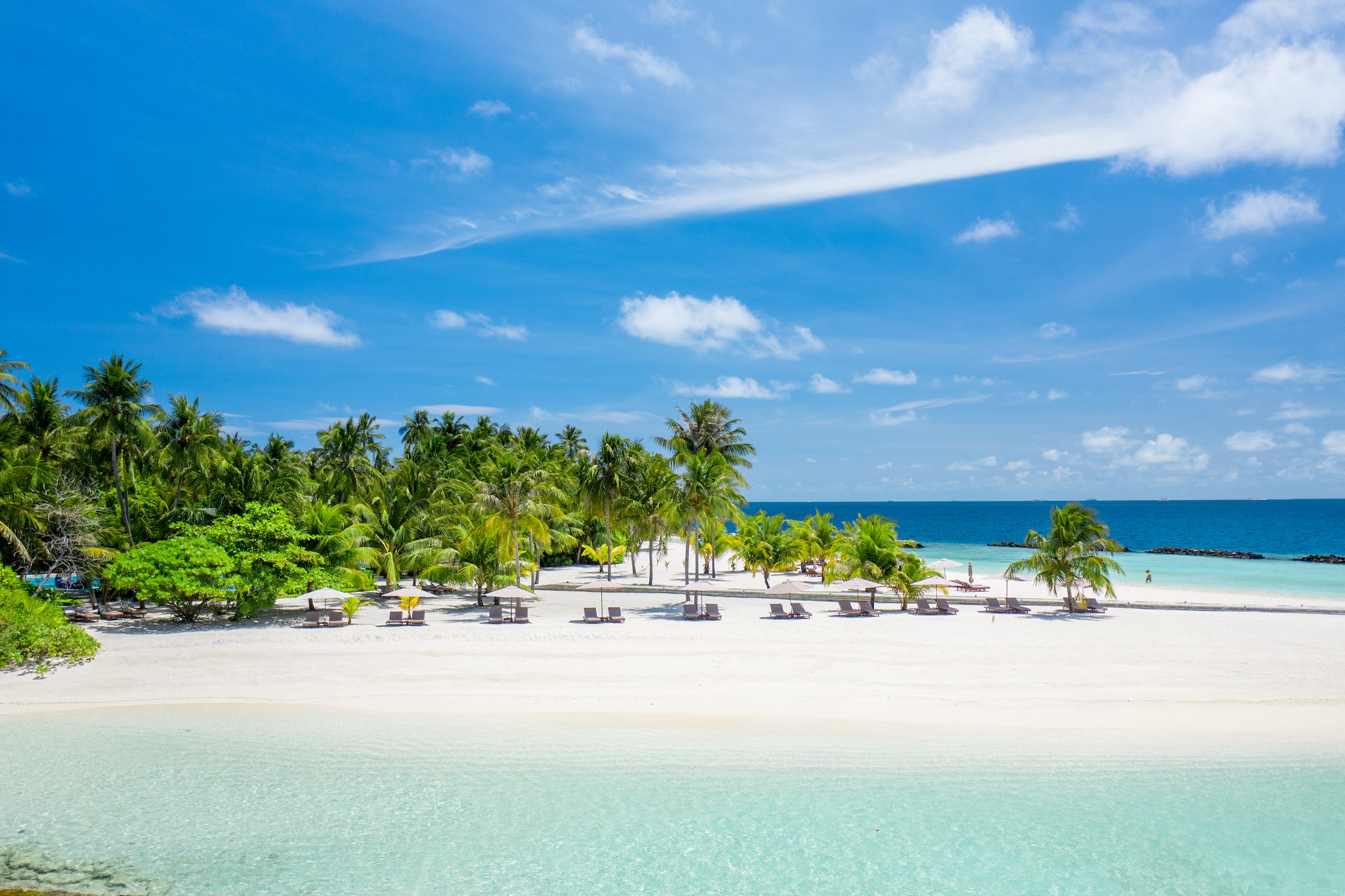
Travel Worry Free
Let Blue Cross travel coverage take care of any unexpected medical emergency costs so you can make the most of your trip.
Whether you travel frequently during the year, take regular sun destination trips or do only occasional short trips, there is a plan that’s right for you.
Blue Cross is a member of a trusted global network, including the American Blue Cross & Blue Shield Association and the International Federation of Health Funds.

Canadians are optimistic about travel in 2024
The cost of travel is on the rise, but that isn’t stopping most Canadians from planning a vacation.
A ccording to a new study from Blue Cross , Canadians spent an average of $4,200 on their last vacation, and 94 per cent feel the cost of travelling is increasing .
H owever , the 2024 Blue Cross Travel Study also reveals that more Canadians are feeling optimistic about travel and are planning more trips this year.

Find the Right Plan
We understand making the right choice for your benefits and coverage is important.
We’re here to help!
Please click below to be redirected to your local Blue Cross for more specifics, including local contact information.
Newsletter Heading
Lorem ipsum dolor sit amet till, consectetur adipicing elit till.
Choose your region
- Skip to main content
- Skip to "About this site"
Language selection
Search travel.gc.ca.
Help us to improve our website. Take our survey !
COVID-19: travel health notice for all travellers
Australia travel advice
Latest updates: Natural disasters and climate – removed information on Tropical Cyclone Megan
Last updated: April 10, 2024 05:31 ET
On this page
Safety and security, entry and exit requirements, laws and culture, natural disasters and climate, australia - take normal security precautions.
Take normal security precautions in Australia.
Back to top
Violent crime is low.
Petty crime, such as pickpocketing and bag snatching, occurs mostly in larger cities. Vehicle break-ins are common.
Robberies of safe-deposit facilities are common at inexpensive hotels and hostels.
- Ensure that your personal belongings, including your passport and other travel documents, are secure at all times
- Never leave personal belongings, such as money, credit cards, cell phones and other electronics, unattended
- Exercise caution in popular tourist areas
Online scam
Scammers have duped tourists into transferring money to an overseas bank account in exchange for renting accommodation in Australia.
When renting accommodation, beware of online scams.
Overseas fraud
Demonstrations
Demonstrations may occur. Even peaceful demonstrations can turn violent at any time. They can also lead to disruptions to traffic and public transportation.
- Avoid areas where demonstrations are taking place
- Follow the instructions of local authorities
- Monitor local media for information on ongoing demonstrations
More about mass gatherings (large-scale events)
There is a threat of terrorism. The Government of Australia maintains a national terrorism threat advisory system. Individuals or groups have developed both the intent and capability to conduct a terrorist attack in Australia. Terrorist attacks could occur at any time.
Targets could include:
- government buildings, including schools
- places of worship
- airports and other transportation hubs and networks
- public areas such as tourist attractions, restaurants, bars, coffee shops, shopping centres, markets, hotels and other sites frequented by foreigners
Always be aware of your surroundings when in public places.
Australian National Security – Government of Australia
Spiked food and drinks
Never leave food or drinks unattended or in the care of strangers. Be wary of accepting snacks, beverages, gum or cigarettes from new acquaintances, as they may contain drugs that could put you at risk of sexual assault and robbery.
Water activities
Coastal waters can be dangerous. Riptides are common and can be dangerous. Several drownings occur each year.
In certain areas, sharks, crocodiles, jellyfish and other wildlife pose a risk to swimmers.
- Avoid unsupervised beaches
- Follow the instructions and warnings of lifeguards
- Respect the flag warning system, which provides notice of water conditions and safety risks on beaches
Beach safety – Government of Australia
Diving and snorkelling
You must provide a medical declaration for diving or snorkelling.
Follow the instructions and warnings of local authorities.
Safety information for divers and snorkellers – Government of Australia
Trekking and mountaineering
Weather conditions may be dry during the summer. You should be prepared for hot weather.
If you intend on trekking or mountaineering:
- never do so alone and always hire an experienced guide from a reputable company
- buy travel insurance that includes helicopter rescue and medical evacuation
- ensure that your physical condition is good enough to meet the challenges of your activity
- ensure that you’re properly equipped and well informed about weather and other conditions that may pose a hazard
- inform a family member or friend of your itinerary, including when you expect to be back to camp
- obtain detailed information on trekking routes before setting out and do not venture off marked trails or slopes
Remote areas
Some regions in Australia’s interior are very isolated and have small populations. Services are scarce.
You may have difficulty getting adequate mobile phone coverage if you travel there by car.
- Avoid travelling alone
- Inform relatives of your itinerary
Road safety
Road conditions and road safety are very good throughout the country. Exercise caution when driving in rural areas at night. Drivers often drive at excessive speeds. Roaming animals and road trains pose further hazards.
Access to some remote locations may be impossible during severe weather conditions. Due to the great distances between settlements and the isolation of many outback areas:
- avoid travelling in extreme heat conditions
- plan your overland route carefully
- provide a friend or relative with your itinerary, and ensure that your vehicle is in good repair
- carry a first-aid kit and personal medication
- carry sufficient fuel, water, and food supplies
- bring a satellite phone or an emergency position indicating radio beacon (EPIRB)
We do not make assessments on the compliance of foreign domestic airlines with international safety standards.
Information about foreign domestic airlines
Every country or territory decides who can enter or exit through its borders. The Government of Canada cannot intervene on your behalf if you do not meet your destination’s entry or exit requirements.
We have obtained the information on this page from the Australian authorities. It can, however, change at any time.
Verify this information with the Foreign Representatives in Canada .
Entry requirements vary depending on the type of passport you use for travel.
Before you travel, check with your transportation company about passport requirements. Its rules on passport validity may be more stringent than the country’s entry rules.
Regular Canadian passport
Your passport must be valid on the day of entry into the country.
Passport for official travel
Different entry rules may apply.
Official travel
Passport with “X” gender identifier
While the Government of Canada issues passports with an “X” gender identifier, it cannot guarantee your entry or transit through other countries. You might face entry restrictions in countries that do not recognize the “X” gender identifier. Before you leave, check with the closest foreign representative for your destination.
Other travel documents
Different entry rules may apply when travelling with a temporary passport or an emergency travel document. Before you leave, check with the closest foreign representative for your destination.
Useful links
- Foreign Representatives in Canada
- Canadian passports
Tourist visa: not required for stays up to 90 days Business visa: required Student visa: required
Canadians entering Australia without a visa need to get an electronic travel authority (ETA) to visit Australia. Ensure that you travel with the same passport used to apply for your ETA.
A health examination might be necessary to obtain certain visas.
- Electronic Travel Authority – Government of Australia
- Department of Home Affairs – Government of Australia
Children and travel
Learn more about travelling with children .
Yellow fever
Learn about potential entry requirements related to yellow fever (vaccines section).
Relevant Travel Health Notices
- Global Measles Notice - 13 March, 2024
- COVID-19 and International Travel - 13 March, 2024
This section contains information on possible health risks and restrictions regularly found or ongoing in the destination. Follow this advice to lower your risk of becoming ill while travelling. Not all risks are listed below.
Consult a health care professional or visit a travel health clinic preferably 6 weeks before you travel to get personalized health advice and recommendations.
Routine vaccines
Be sure that your routine vaccinations , as per your province or territory , are up-to-date before travelling, regardless of your destination.
Some of these vaccinations include measles-mumps-rubella (MMR), diphtheria, tetanus, pertussis, polio, varicella (chickenpox), influenza and others.
Pre-travel vaccines and medications
You may be at risk for preventable diseases while travelling in this destination. Talk to a travel health professional about which medications or vaccines may be right for you, based on your destination and itinerary.
Yellow fever is a disease caused by a flavivirus from the bite of an infected mosquito.
Travellers get vaccinated either because it is required to enter a country or because it is recommended for their protection.
- There is no risk of yellow fever in this country.
Country Entry Requirement*
- Proof of vaccination is required if you are coming from or have transited through an airport of a country where yellow fever occurs.
Recommendation
- Vaccination is not recommended.
- Discuss travel plans, activities, and destinations with a health care professional.
- Contact a designated Yellow Fever Vaccination Centre well in advance of your trip to arrange for vaccination.
About Yellow Fever
Yellow Fever Vaccination Centres in Canada * It is important to note that country entry requirements may not reflect your risk of yellow fever at your destination. It is recommended that you contact the nearest diplomatic or consular office of the destination(s) you will be visiting to verify any additional entry requirements.
Hepatitis B is a risk in every destination. It is a viral liver disease that is easily transmitted from one person to another through exposure to blood and body fluids containing the hepatitis B virus. Travellers who may be exposed to blood or other bodily fluids (e.g., through sexual contact, medical treatment, sharing needles, tattooing, acupuncture or occupational exposure) are at higher risk of getting hepatitis B.
Hepatitis B vaccination is recommended for all travellers. Prevent hepatitis B infection by practicing safe sex, only using new and sterile drug equipment, and only getting tattoos and piercings in settings that follow public health regulations and standards.
Measles is a highly contagious viral disease. It can spread quickly from person to person by direct contact and through droplets in the air.
Anyone who is not protected against measles is at risk of being infected with it when travelling internationally.
Regardless of where you are going, talk to a health care professional before travelling to make sure you are fully protected against measles.
Japanese encephalitis is a viral infection that can cause swelling of the brain. It is spread to humans through the bite of an infected mosquito. Risk is very low for most travellers. Travellers at relatively higher risk may want to consider vaccination for JE prior to travelling.
Travellers are at higher risk if they will be:
- travelling long term (e.g. more than 30 days)
- making multiple trips to endemic areas
- staying for extended periods in rural areas
- visiting an area suffering a JE outbreak
- engaging in activities involving high contact with mosquitos (e.g., entomologists)
The best way to protect yourself from seasonal influenza (flu) is to get vaccinated every year. Get the flu shot at least 2 weeks before travelling.
The flu occurs worldwide.
- In the Northern Hemisphere, the flu season usually runs from November to April.
- In the Southern Hemisphere, the flu season usually runs between April and October.
- In the tropics, there is flu activity year round.
The flu vaccine available in one hemisphere may only offer partial protection against the flu in the other hemisphere.
The flu virus spreads from person to person when they cough or sneeze or by touching objects and surfaces that have been contaminated with the virus. Clean your hands often and wear a mask if you have a fever or respiratory symptoms.
Coronavirus disease (COVID-19) is an infectious viral disease. It can spread from person to person by direct contact and through droplets in the air.
It is recommended that all eligible travellers complete a COVID-19 vaccine series along with any additional recommended doses in Canada before travelling. Evidence shows that vaccines are very effective at preventing severe illness, hospitalization and death from COVID-19. While vaccination provides better protection against serious illness, you may still be at risk of infection from the virus that causes COVID-19. Anyone who has not completed a vaccine series is at increased risk of being infected with the virus that causes COVID-19 and is at greater risk for severe disease when travelling internationally.
Before travelling, verify your destination’s COVID-19 vaccination entry/exit requirements. Regardless of where you are going, talk to a health care professional before travelling to make sure you are adequately protected against COVID-19.
In this destination, rabies may be present in some wildlife species, including bats. Rabies is a deadly disease that spreads to humans primarily through bites or scratches from an infected animal.
If you are bitten or scratched by an animal while travelling, immediately wash the wound with soap and clean water and see a health care professional.
Before travel, discuss rabies vaccination with a health care professional. It may be recommended for travellers who will be working directly with wildlife.
Safe food and water precautions
Many illnesses can be caused by eating food or drinking beverages contaminated by bacteria, parasites, toxins, or viruses, or by swimming or bathing in contaminated water.
- Learn more about food and water precautions to take to avoid getting sick by visiting our eat and drink safely abroad page. Remember: Boil it, cook it, peel it, or leave it!
- Avoid getting water into your eyes, mouth or nose when swimming or participating in activities in freshwater (streams, canals, lakes), particularly after flooding or heavy rain. Water may look clean but could still be polluted or contaminated.
- Avoid inhaling or swallowing water while bathing, showering, or swimming in pools or hot tubs.
Insect bite prevention
Many diseases are spread by the bites of infected insects such as mosquitoes, ticks, fleas or flies. When travelling to areas where infected insects may be present:
- Use insect repellent (bug spray) on exposed skin
- Cover up with light-coloured, loose clothes made of tightly woven materials such as nylon or polyester
- Minimize exposure to insects
- Use mosquito netting when sleeping outdoors or in buildings that are not fully enclosed
To learn more about how you can reduce your risk of infection and disease caused by bites, both at home and abroad, visit our insect bite prevention page.
Find out what types of insects are present where you’re travelling, when they’re most active, and the symptoms of the diseases they spread.
- In this country, risk of dengue is sporadic. It is a viral disease spread to humans by mosquito bites.
- Dengue can cause flu-like symptoms. In some cases, it can lead to severe dengue, which can be fatal.
- The level of risk of dengue changes seasonally, and varies from year to year. The level of risk also varies between regions in a country and can depend on the elevation in the region.
- Mosquitoes carrying dengue typically bite during the daytime, particularly around sunrise and sunset.
- Protect yourself from mosquito bites . There is no vaccine or medication that protects against dengue fever.
Animal precautions
Some infections, such as rabies and influenza, can be shared between humans and animals. Certain types of activities may increase your chance of contact with animals, such as travelling in rural or forested areas, camping, hiking, and visiting wet markets (places where live animals are slaughtered and sold) or caves.
Travellers are cautioned to avoid contact with animals, including dogs, livestock (pigs, cows), monkeys, snakes, rodents, birds, and bats, and to avoid eating undercooked wild game.
Closely supervise children, as they are more likely to come in contact with animals.
Person-to-person infections
Stay home if you’re sick and practise proper cough and sneeze etiquette , which includes coughing or sneezing into a tissue or the bend of your arm, not your hand. Reduce your risk of colds, the flu and other illnesses by:
- washing your hands often
- avoiding or limiting the amount of time spent in closed spaces, crowded places, or at large-scale events (concerts, sporting events, rallies)
- avoiding close physical contact with people who may be showing symptoms of illness
Sexually transmitted infections (STIs) , HIV , and mpox are spread through blood and bodily fluids; use condoms, practise safe sex, and limit your number of sexual partners. Check with your local public health authority pre-travel to determine your eligibility for mpox vaccine.
Medical services and facilities
Health care is excellent. Service is available throughout the country.
Payment is expected at time of service.
Make sure you get travel insurance that includes coverage for medical evacuation and hospital stays.
Travel health and safety
Keep in Mind...
The decision to travel is the sole responsibility of the traveller. The traveller is also responsible for his or her own personal safety.
Be prepared. Do not expect medical services to be the same as in Canada. Pack a travel health kit , especially if you will be travelling away from major city centres.
You must abide by local laws.
Learn about what you should do and how we can help if you are arrested or detained abroad .
Canada and Australia are signatories to the Convention on the Transfer of Sentenced Persons. This enables a Canadian imprisoned in Australia to request a transfer to a Canadian prison to complete a sentence. The transfer requires the agreement of both Canadian and Australian authorities. This process can take a long time and there is no guarantee that the transfer will be approved by either or both sides.
Penalties for possession, use or trafficking of illegal drugs are severe. Convicted offenders can expect lengthy jail sentences and heavy fines.
Drugs, alcohol and travel
Imports and exports
There are very strict rules and quarantine measures regarding the importation of food and animal products. Information about items which you can and cannot bring to Australia is available from Australia’s Department of Home Affairs.
Immigration and Citizenship – Government of Australia
Traffic drives on the left.
Local authorities accept your overseas driving licence if the names on your licence match exactly those in your passport.
You must apply for a local licence if you intend to stay in Australia longer than 3 months.
Permits are required when travelling on Aboriginal territory.
You should carry an international driving permit.
- Driving with an overseas licence – Government of Australia
- More about the International Driving Permit
Dual citizenship
Dual citizenship is legally recognized in Australia.
If you are a Canadian citizen, but also a citizen of Australia, our ability to offer you consular services may be limited while you're there. You may also be subject to different entry/exit requirements .
Travellers with dual citizenship
International Child Abduction
The Hague Convention on the Civil Aspects of International Child Abduction is an international treaty. It can help parents with the return of children who have been removed to or retained in certain countries in violation of custody rights. The convention applies between Canada and Australia.
If your child was wrongfully taken to, or is being held in Australia, and if the applicable conditions are met, you may apply for the return of your child to the Australian court.
If you are in this situation:
- act as quickly as you can
- contact the Central Authority for your province or territory of residence for information on starting an application under The Hague Convention
- consult a lawyer in Canada and in Australia to explore all the legal options for the return of your child
- report the situation to the nearest Canadian government office abroad or to the Vulnerable Children’s Consular Unit at Global Affairs Canada by calling the Emergency Watch and Response Centre
If your child was removed from a country other than Canada, consult a lawyer to determine if The Hague Convention applies.
Be aware that Canadian consular officials cannot interfere in private legal matters or in another country’s judicial affairs.
- List of Canadian Central Authorities for the Hague Convention
- International Child Abduction: A Guidebook for Left-Behind Parents
- Travelling with children
- The Hague Convention - Hague Conference on Private International Law
- Canadian embassies and consulates by destination
- Emergency Watch and Response Centre
The currency of Australia is the Australian dollar (AUD).
Bush and forest fires
Bush and forest fires are common between October and April, particularly in areas covered by bushes, long grass or coastal scrub. Elevated fire danger ratings and alert levels may be applied to affected areas. The air quality in areas near active fires may deteriorate due to heavy smoke.
In case of a major fire:
- stay away from the affected area, particularly if you suffer from respiratory ailments
- be prepared to modify your travel arrangements or even evacuate the area on short notice
- follow the instructions of local emergency services personnel
- monitor local media for up-to-date information on the situation
For current information, consult the relevant state or territory authorities.
Fire services
- Australian Capital Territory
- New South Wales
- Northern Territory
- South Australia
- Western Australia
Rainy season
The rainy season extends from November to April. Severe flooding occurs annually, especially in the inland parts of the following states:
Seasonal flooding can hamper overland travel and reduce the provision of essential services. Roads may become impassable and bridges damaged.
- Monitor local news and weather reports
- Follow the instructions of local authorities, including evacuation orders
Australia Rainfall and river conditions – Bureau of meteorology, Australian government
Cyclones usually occur from November to April. They may occur along the coastal areas of Queensland, the Northern Territory and Western Australia.
During this period, even small storms can quickly develop into major cyclones. These severe storms can put you at risk and hamper the provision of essential services.
If you decide to travel to Australia during the cyclone season:
- know that you expose yourself to serious safety risks
- be prepared to change your travel plans on short notice, including cutting short or cancelling your trip
- stay informed of the latest regional weather forecasts
- carry emergency contact information for your airline or tour operator
- follow the advice and instructions of local authorities
- Bureau of Meteorology – Government of Australia
- Tornadoes, cyclones, hurricanes, typhoons and monsoons
- Large-scale emergencies abroad
Seismic activity
Australia is located in a seismic zone. Earthquakes may occur.
Local services
Dial 000 for emergency assistance.
Consular assistance
Australian Capital Territory, Victoria, South Australia, Western Australia, Tasmania, Guam, Marshall Islands, Micronesia, Nauru, New Caledonia, Northern Marianas, Palau, Papua New Guinea, Solomon Islands, Vanuatu
New South Wales, Queensland and Northern Territory
For emergency consular assistance, call the High Commission of Canada in Australia, in Canberra, or the Consulate General of Canada in Sydney and follow the instructions. At any time, you may also contact the Emergency Watch and Response Centre in Ottawa.
The decision to travel is your choice and you are responsible for your personal safety abroad. We take the safety and security of Canadians abroad very seriously and provide credible and timely information in our Travel Advice to enable you to make well-informed decisions regarding your travel abroad.
The content on this page is provided for information only. While we make every effort to give you correct information, it is provided on an "as is" basis without warranty of any kind, expressed or implied. The Government of Canada does not assume responsibility and will not be liable for any damages in connection to the information provided.
If you need consular assistance while abroad, we will make every effort to help you. However, there may be constraints that will limit the ability of the Government of Canada to provide services.
Learn more about consular services .
Risk Levels
take normal security precautions.
Take similar precautions to those you would take in Canada.
Exercise a high degree of caution
There are certain safety and security concerns or the situation could change quickly. Be very cautious at all times, monitor local media and follow the instructions of local authorities.
IMPORTANT: The two levels below are official Government of Canada Travel Advisories and are issued when the safety and security of Canadians travelling or living in the country or region may be at risk.
Avoid non-essential travel
Your safety and security could be at risk. You should think about your need to travel to this country, territory or region based on family or business requirements, knowledge of or familiarity with the region, and other factors. If you are already there, think about whether you really need to be there. If you do not need to be there, you should think about leaving.
Avoid all travel
You should not travel to this country, territory or region. Your personal safety and security are at great risk. If you are already there, you should think about leaving if it is safe to do so.
- Travel to Australia
Travel insurance from Canada to Australia
Best travel insurance for canadians, australia travel insurance for canadians, travel health insurance for australia from canada.
Traveling from Canada to Australia offers a thrilling adventure filled with diverse landscapes, vibrant cities, and unique experiences. To visit Australia, Canadian citizens need to obtain an Electronic Travel Authority (ETA) or eVisitor visa in advance.
These visas allow for tourist stays of up to 3 months and can be applied for online. Many Canadian airports provide direct flights to different Australian cities, making it easy and convenient to reach the desired destination.
Do I need insurance to travel to Australia?
When traveling from Canada to Australia, it is highly recommended to buy the best travel insurance for Australia from Canada to ensure a smooth and worry-free journey. Canadian medical insurance for travel to Australia provides valuable coverage for a range of unforeseen circumstances that may occur during your travels. It offers financial protection and peace of mind throughout your trip.
One of the key aspects to consider is best travel insurance in Australia. While Australia boasts excellent healthcare facilities, the costs for medical services is high for visitors. Canadian provincial health insurance may not fully cover medical expenses abroad, making travel insurance with comprehensive medical coverage essential. Travel health insurance for Australia can include emergency medical treatment, hospitalization, medical evacuation, and repatriation, ensuring that you receive proper care without incurring exorbitant expenses.
Who has the best travel insurance in Australia?
Before buying medical insurance for travel to Australia, it is important to compare the best international travel insurance plans on American Visitor Insurance for prices as well as coverage benefits, including coverage limits and exclusions. Comparing quotes from different insurance providers on American Visitor Insurance helps you find the policy that best suits your needs and provides comprehensive coverage for your trip to Australia. Remember to carry a copy of your travel insurance policy and emergency contact information with you during your journey.
Australia - General Information
Australia, officially known as the Commonwealth of Australia, is a country located in the southern hemisphere comprising the mainland of the Australian continent, the island of Tasmania, and numerous smaller islands. Australia is the only country that occupies an entire continent. It is bordered by the Indian Ocean to the west and the Pacific Ocean to the east. The country shares maritime borders with Indonesia, East Timor, Papua New Guinea, the Solomon Islands, Vanuatu, and New Zealand. Canberra is the capital city of Australia. However, the largest city and economic hub of the country is Sydney. English is the official language of Australia and is widely spoken throughout the country. The currency of Australia is the Australian Dollar (AUD). Australia has a mixed-market economy with a strong focus on services, mining, and agriculture. It is one of the world's largest exporters of minerals and resources such as coal, iron ore, gold, and natural gas.
Popular tourist destinations in Australia

Great Barrier Reef
It is one of the oldest living coral reefs in the world, and also is one of the largest. There are more than 2,000 different kinds of fish and 500 species of coral polyps.

Fraser Island
It is the world's largest sand island, stretching over 120km. Panoramic viewpoints include Indian Head, and a cliff famous for sculpted ribbons of coloured sand.

Sydney, capital of New South Wales and one of Australia's largest cities, is best known for its harbourfront Sydney Opera House, with a distinctive sail-like design.

Melbourne is the second-most populous city in Australia and Oceania. At the city's centre is the modern Federation Square development by the Yarra River.
International travel health insurance

Covers hospital expenses for sickness or accidents.

Insures Doctor visits for sudden injury or sickness.

Doctor prescribed eligible pharmacy drugs expenses

Some plans insure acute onset of pre-existing conditions.

Medical evacuation expenses to nearest facility included.

Repatriation of remains to home country included.
Factors for cost of travel insurance from Canada to Australia
Age of the traveler.
The cost of travel insurance is directly proportional to the age of the traveler. The older the traveler and greater will be the cost of the visitors health insurance.
Type of travel insurance
Comprehensive travel insurance which provide exhaustive coverage are more expensive. Traveler can select between single trip or multi trip travel insurance .
Medical maximum coverage
The price of travel insurance is directly dependent on the maximum medical coverage and inversely proportional to the deductible of the plan chosen.
Region of coverage
Travel insurance depends on the coverage region. The cost for travel health insurance in some countries is more expensive than others.
Duration of travel insurance
The longer the duration of visitor medical insurance required, the higher will be the cost.
Any add on benefits
Additional add-on benefits like adventure sports coverage … will increase the cost of coverage.
Steps to buy Travel insurance for Australia from Canada
1: find international travel insurance canada from australia.
Complete the travel insurance quote request form by providing details of the traveller and insurance requirements.
2: Compare the different travel insurance options
Compare the price and the benefits of the different travel insurance options to identify what fits your needs best.
3: Buy the travel insurance that you like best
Purchase the plan that fits your needs and budget best by using a credit card and completing the online application.
4: Review insurance plan documents received by email
Review the travel insurance documents received by email closely for coverage details and relevant contact numbers

Testimonials - From Our Customers
Thank you for such helpful information. You've impressed me as I have contacted other companies and haven't gotten half of the information from them that you have sent me. I will take what you've said into consideration and hope to be in touch soon. Know more »
I recently visited your website for the first time to buy insurance for travel to US. I found the information very good. Your customer support was fantastic and awesome. You were so dedicated to take care of my inquiries. I would rate your service 100/100. Know more »
I am pleased to say that your company is very professional in the field of Insurance. The customer is happy to get easily connected and then you very patiently explain the difference between various plans to suit each customer's need. Know more »
Lori Fields
Best travel insurance for cruises.
Going on a cruise vacation is truly exciting, however one must take suitable action to ensure that the cruise vacation is not a disappointment. Vacationers are likely to book for the cruise well in advance of the actual travel dates, and it is possible that one is not able to make the cruise as planned.
Best Cruise trip insurance ensures that vacationers can vacation investment should there be a disruption and one cannot make the cruise. Most cruises offers Cruise protection, but that is not the same as trip insurance for cruises.
A cruise protection usually gives vouchers for the traveler if they miss the cruise, but getting money back is not the norm, which is what trip insurance for cruises offer.

Cruise travel insurance for US citizen
Cruise travel insurance for pre-existing, embassy of canada in australia, canada high commission.
in Canberra Commonwealth Avenue ACT 2600 Canberra Australia
Email [email protected]
Fax +61-2-6270-4060
Phone +61-2-6270-4000
Canada Consulate
in Victoria Level 50, 101 Collins Street 3000 Melbourne Victoria Australia
+61-3-9653-9674
Fax +61-3-9653-9870
Email [email protected]
Canada Embassy
Canada consulate in perth.
in Perth 267 St.George's Terrace, Third Floor Perth Australia
Phone +61-8-9322-7930
Email www.australia.gc.ca
Canada Consulate in Sydney
in Sydney Level 5, 111 Harrington Street NSW 2000 Sydney Australia
Phone +61-2-9364-3000
Fax +61-2-9364-3098
Email [email protected]
Canadians travelling to Australia
- Travel Insurance: It's highly recommended to have travel insurance that covers medical emergencies, trip cancellations, and other unexpected events. If you are a Canadian "snowbird" planning to spend an extended period in Australia during the winter months (typically from December to March), you may want to consider purchasing specialized travel insurance to cover your needs. Snowbird travel insurance is designed for long-term travelers, like snowbirds, who leave their home country for an extended period.
Travel insurance is important white travelling to Australia from Canada, as it can provide coverage for various unexpected events and emergencies during your trip. When looking for travel insurance, consider the following factors:
- Medical coverage: Ensure that your policy covers medical expenses, including hospitalization, doctor visits, and emergency medical evacuation. This is crucial, as healthcare costs in Australia can be high.
- Trip cancellation and interruption: This can help you recover your expenses if you have to cancel or cut short your trip due to unforeseen events.
- Baggage and personal belongings: Coverage for lost, stolen, or damaged luggage and personal items.
- Travel delays: Compensation for expenses incurred due to flight delays, such as accommodation and meals.
- Pre-Existing Medical Conditions: If you have pre-existing medical conditions, make sure your policy covers them or consider purchasing a separate policy for these conditions.
- Activities and Sports: If you plan to engage in adventurous activities, such as hiking or scuba diving, ensure your policy covers them. Some activities may require additional coverage.
- Deductibles: Understand the deductibles associated with your policy and how they may affect your out-of-pocket expenses in the event of a claim.
- Exclusions: Review the policy exclusions to know what is not covered. Common exclusions include extreme sports, acts of war, or reckless behavior.
- Compare Quotes: Get quotes from multiple insurance providers on American Visitors Insurance Website and compare their coverage, limits, and prices to find the best Canadian travel insurance for Australia.
- Canadian Government Travel Advisories: Keep an eye on the Government of Canada's travel advisories for Australia to stay informed about any travel warnings or recommendations.
- Read the Policy: Carefully read the terms and conditions of the policy, so you understand what is covered and how to make a claim.
Travel insurance for pre-existing conditions
A pre-existing condition is a medical ailment that existed before the start of the Australia travel insurance. Most international travel insurance to Australia from Canada exclude coverage for pre-existing conditions. Many senior citizen travelers usually have pre-existing medical conditions, and only some travel health insurance for Australia may provide coverage for these conditions. It's crucial to check the policy details, waiting periods, and any requirements for pre-existing conditions coverage. Some travel health insurance from Canada to Australia plans like Patriot International Lite , Patriot Platinum and Travel Medical Choice offers coverage for the acute onset of a pre-existing conditions, ie, when there is a sudden medical emergency without any prior symptom that needs to be treated immediately. The coverage typically includes emergency medical treatment, hospitalization, and evacuation expenses related to the acute onset of the pre-existing condition. Safe Travels International offers coverage for unexpected recurrence of pre-existing conditions. It is important to compare travel insurance for pre-existing conditions both for the price as well as the specific details for pre-existing conditions coverage. Do review the policy brochures for exclusions and coverage limits before making a decision.
Travel medical insurance Australia - FAQ's
01. why do canadians need travel insurance when visiting australia.
There are many reasons why you need visitor insurance for Australia from the Canada:
The Canadian healthcare system covers residents domestically, but it generally doesn't provide full coverage for medical expenses incurred while traveling abroad.
Compared to Canada, Australian healthcare can be significantly more expensive, especially for foreigners who may not have access to the public healthcare system on the same terms as Australian citizens.
International travel insurance to Australia from Canada is important and even essential when traveling to Australia from the Canada to protect yourself financially from unforeseen travel and medical related circumstances. It provides coverage for medical emergencies, trip cancellation or interruption, lost or delayed baggage, and other unexpected events that could disrupt your trip.
02. What does travel insurance for Australia from Canada typically cover?
Canada travel insurance for Australia typically covers medical expenses, emergency medical evacuation, trip cancellation or interruption, baggage loss or delay, travel delays, and personal liability. However, the coverage will vary depending on the specific insurance plan you choose. It is very useful to make an informed decision by comparing the best Canada travel insurance for Australia on American Visitor Insurance.
The travel insurance for Australia from Canada typically has the following coverage benefits:
- Emergency medical expenses: for any sudden and unforeseen illness or injury that requires medical treatment while you are in Australia. This may include hospitalization, ambulance, prescription drugs, dental care, and repatriation.
- Trip cancellation and interruption: for any non-refundable prepaid travel arrangements that you have to cancel or cut short due to a covered reason, such as sickness, injury, death, natural disaster, or travel advisory.
- Lost or stolen baggage: for any personal belongings that are lost, stolen, or damaged during your trip, up to a certain limit. This may also include baggage delay benefits if your luggage is delayed for more than a specified period of time.
- Other benefits: such as travel assistance, accidental death and dismemberment, flight accident, rental car damage, and personal liability. These benefits will vary depending on the plan and provider you choose.
03. Can I use my existing health insurance in Australia?
While it depends on your health insurance policy, most Canadians health insurance plans provide little to no coverage outside Canada borders, and this includes Medicare. Even if your health insurance covers medical expenses, it will not include other travel-related benefits like trip cancellation or baggage loss.
It is recommended to compare the best travel insurance for Australia from Canada on American Visitor Insurance and consult an insurance advisor at 877-340-7910 to make a well informed decision in finding the best Canada visitor insurance for Australia.
04. Will my travel insurance for Australia cover me if I have a pre-existing medical condition?
When buying travel insurance for Australia, it is important understand the coverage for pre-existing conditions and to clearly disclose any pre-existing medical conditions you may have in the online application form if mentioned. Some INF travel insurance plans offer good coverage for pre-existing conditions, while some offer coverage for acute onset of pre-existing conditions, while still others exclude pre-existing conditions coverage entirely. Be sure to compare the pre-existing conditions visitor insurance plans on American Visitor Insurance to understand how your pre-existing conditions are covered, if at all.
05. How much does travel insurance Australia from Canada cost?
The cost of travel health insurance for Australia can vary depending on several factors, including your age, duration of the trip, coverage limits, and the type of plan you choose. On average, it can range from 4% to 10% of the total trip cost.
06. Can I stay in Australia without health insurance?
No, it is not recommended to stay in Australia without health insurance. Visitors to Australia do not have access to US Medicare, and are therefore responsible for all costs associated with hospital, medical and para-medical health care rendered in Australia, whether provided in a public and or private hospital setting.
07. Can business travelers buy travel insurance for Australia from Canada?
Travel insurance from Canada to Australia is available to all business travelers. And if you are a frequent traveler, you can buy a multi-trip Australia travel insurance plan .
08. Do you need insurance for tourist visa Australia?
Generally, you don't need to hold travel health insurance to be granted a visitor or business visitor visa for Australia.
09. Is travel insurance mandatory for Australia?
No, it is not mandatory to buy medical insurance for travel to Australia. However, the Australian government strongly recommends visitors to Australia travel insurance to cover unexpected medical costs. It is important to note that some visas for Australia require mandatory international travel health insurance.
Snowbird travel insurance for Canadians

During winter, many Canadians, particularly senior citizens travel to southern countries where the weather is warmer and more pleasant. These Canadian travelers are commonly known as Snowbirds.During winter, many Canadians, particularly senior citizens travel to southern countries where the weather is warmer and more pleasant. These Canadian travelers are commonly known as Snowbirds.
Since domestic health insurance in Canada does not offer coverage outside Canada’s border, buying proper overseas travel insurance from Canada is recommended by the Canadian government authorities. Healthcare expenses in the US and Europe is very high and it is risky to be uninsured while traveling in those countries. Know more »
Best snowbird travel insurance Canada
Canadians annual travel insurance.
Provides coverage for multiple trips within a specified period, typically one year.
Canadians Senior citizens travel insurance
Travel insurance designed for older individuals, often referred to as "snowbirds".
Snowbird pre-existing conditions travel insurance
Provides coverage for individuals with pre-existing medical conditions, particularly for "snowbirds".
Popular outbound destination among Canadian travelers
Us visitors insurance providers.
You can find reliable US insurance providers like International Medical Group(IMG), Seven Corners, Trawick international
More international travel insurance categories
Senior Citizen travel insurance
Pre-existing visitors insurance
International student Insurance
International Medical Insurance
Cruises Travel Insurance
- Call: (877)-340-7910
- Contact
U.S. News takes an unbiased approach to our recommendations. When you use our links to buy products, we may earn a commission but that in no way affects our editorial independence.
The Best Travel Insurance for Australia in 2024

Travelex Insurance Services »

Allianz Travel Insurance »

Generali Global Assistance »

World Nomads Travel Insurance »

GeoBlue »
Why Trust Us
U.S. News evaluates ratings, data and scores of more than 50 travel insurance companies from comparison websites like TravelInsurance.com, Squaremouth and InsureMyTrip, plus renowned credit rating agency AM Best, in addition to reviews and recommendations from top travel industry sources and consumers to determine the Best Travel Insurance for Australia.
Table of Contents
- Travelex Insurance Services
- Allianz Travel Insurance
Most travelers heading "Down Under" need to make quite the trek, and that's especially true for those planning a trip to Australia from the United States. Flying from Los Angeles to Sydney takes around 15 hours, and even more travel time is required to get to Melbourne and other destinations that require a layover on the way.
Plenty can go wrong en route to Australia as well as once you get there, and the potential for financial losses can be great if you're not careful. Not only can traveling long distances increase the risk of travel delays, but you also face the risk of flight cancellations, baggage delays, lost baggage and missed connections.
These are just some of the reasons why it makes sense to have a robust travel insurance plan in place before you fly overseas for a vacation in Australia. While any reputable travel insurance provider can provide you with protection for emergency medical expenses, your bags, travel delays and other various travel mishaps, we curated this list of top travel insurance plans for a trip to Australia specifically.
Frequently Asked Questions
Travel to Australia requires a huge commitment in terms of travel time and cost, which is why you'll want to make sure you have coverage that can reimburse you if something goes wrong. If your flight is delayed or canceled , your bags are lost in transit, or a missed connection leaves you stuck in another country for several days, having travel insurance means you can get reimbursement for unexpected hotel stays, meals you have to pay for and various incidental expenses.
Having travel insurance for Australia that includes medical coverage is also crucial since coverage provided in U.S. health plans will not apply.
Some travel credit cards offer coverage for trip cancellations or interruptions, travel delays, and lost or delayed baggage. However, credit cards are a poor source for coverage that protects against emergency medical expenses. Most credit cards do not offer coverage for emergency medical expenses or emergency medical evacuation at all, and those that do (such as the Chase Sapphire Reserve ) have insufficient coverage limits.
- Travelex Insurance Services: Best for Families
- Allianz Travel Insurance: Best for Flexible Cancellations
- Generali Global Assistance: Best for Medical Emergencies
- World Nomads Travel Insurance: Best for Adventure Travel
- GeoBlue: Best for Travel Health Insurance
Kids ages 17 and younger are covered automatically with Travel Select plan
Primary coverage with no deductibles
Lower limits for medical expenses than some providers
- 100% trip cancellation coverage worth up to $50,000
- 150% trip interruption coverage worth up to $75,000
- Trip delay coverage worth up to $2,000 for delays of five hours or longer ($200 daily limit applies)
- Missed connection coverage worth up to $750 for delays of three hours or longer
- Up to $50,000 in protection for emergency medical expenses (dental sublimit of $500)
- Up to $500,000 in coverage for emergency medical evacuation and repatriation of remains
- Up to $1,000 in coverage for baggage and personal effects
- Up to $200 in coverage for baggage delays of 12 hours or longer
- Up to $200 in coverage for sporting equipment delays of 24 hours or longer
- $25,000 in coverage for accidental death and dismemberment (AD&D)
Optional CFAR coverage reimburses at 80%
Numerous plans to choose from
Lower coverage limits for medical expenses than some providers
- Up to $100,000 per traveler in coverage for trip cancellations
- Up to $150,000 per traveler in coverage for trip interruptions
- Up to $500 per traveler in Trip Change Protector coverage
- Up to $50,000 in emergency medical coverage per traveler
- Up to $500,000 for emergency medical transportation per traveler
- Up to $1,000 toward baggage loss or damage per traveler
- Up to $300 per traveler in coverage for baggage delays of 12 hours or more
- Up to $800 in protection for travel delays per traveler (daily limit of $200 applies)
- $100 per insured person per day in SmartBenefits coverage for eligible delays
- 24-hour hotline assistance
- Concierge services
Tailor medical coverage to your needs
Generous limits for emergency medical and medical evacuation coverage
Coverage for preexisting conditions only available with Premium plan
Optional CFAR coverage with Premium plan only reimburses at 60%
- Trip cancellation coverage up to 100% of the trip cost
- Trip interruption coverage up to 175% of the trip cost
- Travel delay coverage up to $1,000 per traveler ($300 daily limit)
- Up to $2,000 per person in baggage protection; $500 for delays
- Up to $2,000 per person in coverage for sporting equipment; $500 for delays
- Up to $1,000 per person in missed connection coverage
- Up to $250,000 per person in coverage for emergency medical and dental procedures
- Up to $1 million in coverage for emergency assistance and transportation ($10,000 limit for companion hospitality expenses)
- Up to $25,000 per person in rental car coverage
- Accidental death and dismemberment coverage
Coverage for more than 200 sports and activities
24-hour travel assistance services included
Low coverage limits within standard plans
No coverage for most preexisting conditions
- Up to $10,000 in coverage for trip cancellations
- Up to $100,000 in coverage for emergency medical expenses
- Up to $500,000 in protection for emergency medical evacuation
- Up to $3,000 in protection for damage or theft to your bags or gear
Offers travel health insurance for lengthy trips abroad
Deductibles can apply
Some plans require a primary U.S. health insurance plan
- Up to $1,000,000 medical maximum per insured person
- Up to $500,000 in coverage for emergency medical evacuation per trip
- Up to $50,000 in coverage for accidental death and dismemberment
- Up to $2,500 in coverage for emergency family travel arrangements
- Up to $25,000 in medical coverage for hazardous activities like skiing and diving
- Up to $500 per trip in lost baggage and personal effects coverage ($100 limit per bag)
- Up to $1,000 per trip period in post-departure trip interruption transportation
- Up to $50 per day in post-departure trip interruption quarantine coverage (in the case of COVID-19)
- Up to $25,000 in protection for repatriation of remains
Why Trust U.S. News Travel
Holly Johnson is an award-winning writer who has been covering topics like family travel, cruises, all-inclusive resorts and travel insurance for well over a decade. Johnson has researched and purchased travel insurance plans for her own trips, and she has successfully filed claims and received reimbursement more than once over the years. Currently, Johnson uses an annual travel insurance policy from Allianz to cover her family's many trips overseas each year. Johnson also works alongside her husband, Greg – who sells travel insurance for trips all over the world – in their family media business. Johnson also co-owns the travel agency Travel Blue Book .
You might also be interested in:

Travel Insurance for Europe: 4 Best Options for 2024
Holly Johnson
Learn about a range of coverage options for traveling abroad.

The Best Travel Insurance for Mexico in 2024
Find coverage options for medical emergencies, travel delays, lost baggage and more.

Expat Travel Insurance: The 5 Best Options for Globetrotters
Find the coverage and benefits you need for your adventures abroad.

Is Travel Insurance Worth It? Yes, in These 3 Scenarios
These are the scenarios when travel insurance makes most sense.
- Best Travel Insurance 2024
- Cheapest Travel Insurance
- Trip Cancellation Insurance
- Cancel for Any Reason Insurance
- Seniors' Travel Insurance
- Annual Travel Insurance
- Cruise Insurance
- COVID-19 Travel Insurance
- Travel Medical Insurance
- Medical Evacuation Insurance
- Pregnancy Travel Insurance
- Pre-existing Conditions Insurance
- Mexico Travel Insurance
- Italy Travel Insurance
- France Travel Insurance
- Spain Travel Insurance
- Canada Travel Insurance
- UK Travel Insurance
- Germany Travel Insurance
- Bahamas Travel Insurance
- Costa Rica Travel Insurance
- Disney Travel Insurance
- Schengen Travel Insurance
- Is travel insurance worth it?
- Average cost of travel insurance
- Is airline flight insurance worth it?
- Places to travel without a passport
- All travel insurance guides
- Best Pet Insurance 2024
- Cheap Pet Insurance
- Cat Insurance
- Pet Dental Insurance
- Pet Insurance That Pays Vets Directly
- Pet Insurance For Pre-Existing Conditions
- Pet Insurance with No Waiting Period
- Paw Protect Review
- Spot Pet Insurance Review
- Embrace Pet Insurance Review
- Healthy Paws Pet Insurance Review
- Pets Best Insurance Review
- Lemonade Pet Insurance Review
- Pumpkin Pet Insurance Review
- Fetch Pet Insurance Review
- Figo Pet Insurance Review
- CarePlus by Chewy Review
- MetLife Pet Insurance Review
- Average cost of pet insurance
- What does pet insurance cover?
- Is pet insurance worth it?
- How much do cat vaccinations cost?
- How much do dog vaccinations cost?
- All pet insurance guides
- Best Business Insurance 2024
- Business Owner Policy (BOP)
- General Liability Insurance
- E&O Professional Liability Insurance
- Workers' Compensation Insurance
- Commercial Property Insurance
- Cyber Liability Insurance
- Inland Marine Insurance
- Commercial Auto Insurance
- Product Liability Insurance
- Commercial Umbrella Insurance
- Fidelity Bond Insurance
- Business Personal Property Insurance
- Medical Malpractice insurance
- California Workers' Compensation Insurance
- Contractor's Insurance
- Home-Based Business Insurance
- Sole Proprietor's Insurance
- Handyman's Insurance
- Photographer's Insurance
- Esthetician's Insurance
- Salon Insurance
- Personal Trainer's Insurance
- Electrician's Insurance
- E-commerce Business Insurance
- Landscaper's Insurance
- Best Credit Cards of 2024
- Best Credit Card Sign-Up Bonuses
- Best Instant Approval Credit Cards
- Best Cash Back Credit Cards
- Best Rewards Credit Cards
- Best Credit Cards for Bad Credit
- Best Balance Transfer Credit Cards
- Best College Student Credit Cards
- Best 0% APR Credit Cards
- Best First Credit Cards
- Best No Annual Fee Cards
- Best Travel Credit Cards
- Best Hotel Credit Cards
- Best American Express Cards
- Best Amex Delta SkyMiles Cards
- Best American Express Business Cards
- Best Capital One Cards
- Best Capital One Business Cards
- Best Chase Cards
- Best Chase Business Cards
- Best Citi Credit Cards
- Best U.S. Bank Cards
- Best Discover Cards
- Amex Platinum Card Review
- Amex Gold Card Review
- Amex Blue Cash Preferred Review
- Amex Blue Cash Everyday Review
- Capital One Venture Card Review
- Capital One Venture X Card Review
- Capital One SavorOne Card Review
- Capital One Quicksilver Card Review
- Chase Sapphire Reserve Review
- Chase Sapphire Preferred Review
- United Explorer Review
- United Club Infinite Review
- Amex Gold vs. Platinum
- Amex Platinum vs. Chase Sapphire Reserve
- Capital One Venture vs. Venture X
- Capital One Venture X vs. Chase Sapphire Reserve
- Capital One SavorOne vs. Quicksilver
- Chase Sapphire Preferred vs. Capital One Venture
- Chase Sapphire Preferred vs. Amex Gold
- Delta Reserve vs. Amex Platinum
- Chase Sapphire Preferred vs. Reserve
- How to Get Amex Pre-Approval
- Amex Travel Insurance Explained
- Chase Sapphire Travel Insurance Guide
- Chase Pay Yourself Back
- CLEAR vs. TSA PreCheck
- Global Entry vs. TSA Precheck
- Costco Payment Methods
- All Credit Card Guides
- Citibank Savings Account Interest Rate
- Capital One Savings Account Interest Rate
- American Express Savings Account Interest Rate
- Western Alliance Savings Account Interest Rate
- Barclays Savings Account Interest Rate
- Discover Savings Account Interest Rate
- Chase Savings Account Interest Rate
- U.S. Bank Savings Account Interest Rate
- Marcus Savings Account Interest Rate
- Synchrony Bank Savings Account Interest Rate
- Ally Savings Account Interest Rate
- Bank of America Savings Account Interest Rate
- Wells Fargo Savings Account Interest Rates
- SoFi Savings Account Interest Rate
- Best Savings Accounts & Interest Rates
- Best High Yield Savings Accounts
- Best 7% Interest Savings Accounts
- Best 5% Interest Savings Accounts
- Savings Interest Calculator
- Emergency Fund Calculator
- Pros and Cons of High-Yield Savings Accounts
- Types of Savings Accounts
- Checking vs Savings Accounts
- Average Savings by Age
- How Much Should I Have in Savings?
- How to Make Money
- How to Save Money
- Compare Best Checking Accounts
- Compare Online Checking Accounts
- Best Business Checking Accounts
- Compare Best Teen Checking Accounts
- Best Student Checking Accounts
- Best Joint Checking Accounts
- Best Second Chance Checking Accounts
- Chase Checking Account Review
- Bluevine Business Checking Review
- Amex Rewards Checking Account Review
- E&O Professional Liability Insurance
- Best Savings Accounts & Interest Rates
- All Insurance Guides
- Australia Travel Insurance
On This Page
- Key takeaways
Australia travel information & requirements
Do i need travel insurance to visit australia, what does travel insurance for australia cover, what isn’t covered by travel insurance for australia, how much does travel insurance for australia cost, tips for getting the best australia travel insurance, australia travel insurance faqs, related topics.
Australia Travel Insurance: Trip Info & Quotes for U.S. Visitors
- To travel to Australia, you must have a valid U.S. passport , but you don’t need a visa.
- The Australian government doesn’t require American tourists to purchase travel insurance, but it’s wise to have at least medical and medical evacuation coverage since your U.S. health insurance won’t work in Australia .
- In addition to medical emergencies, travel insurance can also cover things like trip cancellations, trip interruptions and rental car damage .
- According to our research, our top picks for travel insurance for Australia come from Travel Insured, Travelex and Faye ( skip ahead to view these plans ).
- We recommend using an online comparison tool to find the best travel insurance policy to suit your needs.
Our top picks for the best australia travel insurance
- Travel Insured International: Best for Robust Coverage
- Travelex Insurance Services: Best for Basic Medical Coverage
- Faye Travel Insurance: Best for Digital Claims Process & App
Our top picks for travel insurance for Australia
Travel insured international, travelex insurance services, faye travel insurance.
Are there COVID-19 restrictions for U.S. tourists?
No. Australia has no COVID-19-related restrictions for American travelers. However, the Australian government does recommend getting the COVID-19 vaccine, wearing masks and practicing good hygiene.
Do I need a visa or passport to travel to Australia?
Yes. You need a valid U.S. passport with at least one blank page for your entry stamp.
Is it safe to visit Australia?
The United States and Australia have a strong diplomatic relationship. Although there’s always some level of risk involved in traveling to a foreign country, Australia is generally safe for Americans. The U.S. Department of State has issued a Level 1 travel advisory , indicating that you don’t need to take any special safety precautions when visiting the “Land Down Under.”
Australia doesn’t require U.S. tourists to buy travel insurance, but we highly recommend purchasing a comprehensive policy before your trip commences.
Below are some risks you may encounter that would make purchasing travel insurance worthwhile .
Risks with adventure activities
Australia is one of the best places to visit if you love parasailing, paragliding, hot air ballooning, diving and other adventure activities. Unfortunately, these activities are risky, so there’s a chance that you’ll break a bone or sustain some other type of injury.
Travel insurance covers medical expenses and other costs associated with these injuries, ensuring you don’t end up with a huge hospital bill. This type of insurance is especially helpful if you plan to explore the Great Barrier Reef, take an excursion into the Outback or swim near the shoreline of one of Australia’s beautiful beaches.
Risks due to wildlife
Australia is full of dangerous critters, from venomous spiders and snakes to aggressive kangaroos. Depending on where you visit, you may end up encountering an unfriendly Tasmanian devil. U.S. medical insurance typically doesn’t work in Australia, so it’s important to have travel insurance for these unexpected situations. If you’re bitten by a Tasmanian devil or sustain some other wildlife-related injury, travel insurance takes the place of your regular medical insurance.
Risks due to bushfires
Bushfires have a high heat output and can cause a significant amount of damage in a short amount of time. If you find yourself in Australia during one of these fires, you may have to contend with damage to your rental car or your personal belongings. Comprehensive travel insurance may reimburse you for damaged or destroyed items, or it may reimburse your rental car agency for the cost of repairing or replacing a damaged vehicle.
Risks related to long-distance driving
Australia has many isolated regions that are hundreds of miles from the nearest populated area. You may have to drive several hundred miles to reach your destination, so it’s important to have travel insurance before you set off on an adventure.
Travel insurance covers a wide range of circumstances, including the ones below.
Trip cancellation insurance
It’s never fun to cancel a vacation you’ve been looking forward to for months, but it’s even worse when a cancellation results in significant financial losses. Trip cancellation insurance protects you if you have to cancel your trip to Australia for a covered reason. For example, if one of your travel companions is diagnosed with advanced cancer before your departure date, you can use your insurance to recoup pre-paid, nonrefundable expenses.
If you want to have coverage for any type of circustance, you can purchase cancel for any reason (CFAR) insurance . Typically sold as an add-on, this type of coverage will reimburse you for around 50% to 70% of your total prepaid costs .
Trip delay insurance
To get to Australia, you may have to rely on the services of multiple common carriers. For example, you may have to fly to Australia and then take a ferry to your final destination. Trip delay insurance reimburses you for any expenses you incur as the result of a common carrier delay. If your flight is canceled, for example, your insurer may reimburse you for meals, additional transportation costs and other related expenses.
Trip interruption insurance
Imagine that you arrive in Australia, enjoy a few days of fun and then come down with a severe illness. You’re so sick that you have to return to the United States sooner than expected. Trip interruption insurance reimburses your pre-paid, nonrefundable expenses in this type of scenario. It should also cover the cost of adjusting your travel plans or accessing emergency assistance services.
Travel medical insurance
As noted previously, you probably won’t be able to use your U.S. health insurance in Australia . Therefore, it’s important to have travel medical insurance to cover things like nursing care, hospitalization, blood tests, CT scans and other healthcare services. If you’re injured while snorkeling or suddenly develop appendicitis during your trip, you can rest easy knowing that your medical expenses are covered.
Medical evacuation insurance
If you’re injured in the Outback, you can’t exactly hop in a cab and get to a hospital within a few minutes. Medical evacuation insurance covers the cost of transporting you to a healthcare facility that’s capable of meeting your needs. For example, if you need emergency assistance, your policy may cover the cost of air medical services (like helicopter transportation).
Insurance for personal items
We recommend that you leave your valuables at home, but if you just have to take jewelry, designer clothing or expensive sports equipment on your trip, make sure your travel insurance includes coverage for lost, stolen and damaged items. This type of coverage reimburses you if a common carrier loses or damages your luggage or its contents.
Rental car coverage
Rental car coverage can protect you under the following circumstances:
- You’re involved in an auto accident caused by someone else.
- Someone vandalizes your rental vehicle.
- Someone steals your rental vehicle.
If your policy includes this type of coverage, your insurer will reimburse the rental agency any time you experience a covered loss. For example, if you get into a fender-bender in one of Sydney’s famous traffic jams, your insurance company should reimburse the rental agency for the cost of repairs.
Travel insurance for Australia doesn’t cover the following:
- Pre-existing conditions: If you’re diagnosed with a medical condition like asthma or diabetes before you buy your travel insurance, your insurer won’t pay for medical expenses associated with that diagnosis. In some cases, however, you can opt for a plan with a waiver. This can ensure coverage for pre-existing conditions during your trip.
- Illegal activities: Travel insurance doesn’t cover expenses arising from any illegal activities, such as injuries that occur while under the influence of illicit substances.
- Fear of travel: If you book a trip and then suddenly develop a fear of flying, your insurance company won’t reimburse you for your pre-paid expenses. The same applies to a fear of seeing a spider or encountering a Tasmanian devil during your trip.
- Expected events: Travel insurance doesn’t cover expenses associated with events that you knew about (or should have known about) before a trip. For example, if you book a trip and buy insurance after a named storm has started developing, your insurer won’t reimburse you if the storm forces you to cancel or interrupt your trip.
For a trip to Australia, we found that the cost of travel insurance ranges from less than $1 per day to around $11 per day depending on the type of coverage.
To give you a better idea, we requested multiple quotes from leading travel insurance providers.
These quotes are based on the following criteria:
- Age: 35 years old
- Destination: Australia
- Trip Length: 7 days
- Trip cost: $2,000
You can see our quotes for basic travel insurance in the following table. The cheapest travel insurance plan costs just under $1 per day .
Example Where Plan Doesn’t Reimburse the Full Trip Cost
The plans in this next table are more comprehensive. In addition to medical and medical evacuation coverage, they also include trip cancellation and trip interruption coverage. According to our quotes, these plans cost between $7 and $11 per day .
Example Where Plan Does Reimburse the Full Trip Cost
Your costs won’t be exactly the same, as insurance companies base their premiums on these factors:
- Trip cost: Insurance companies reimburse you for up to 100% of your prepaid, nonrefundable expenses. The more your trip costs, the more your insurance provider has to pay you if you experience a covered loss. Therefore, the cost of your insurance plan depends on the cost of your trip.
- Age: Older people are more likely to develop serious medical problems while traveling, so it costs more to insure a 60-year-old or 70-year-old traveler than it does to insure someone in their 20s.
- Insurance benefits: Some travel insurance plans come with more benefits than others. For example, a plan that offers $1 million in medical evacuation coverage will cost more than a plan that comes with only $100,000 in medical evacuation coverage.
- Destination: Some destinations are riskier than others, so insurance companies charge different rates based on your itinerary.
- Add-on coverage: You may need to purchase add-on coverage, such as insurance for adventure activities. If so, you’ll pay an additional premium for the extra benefits.
To find the best travel insurance for your needs, follow these tips:
Consider how you’re getting to and around Australia.
You’ll have to take an airplane from the United States to Australia, but depending on your plans, you may also need to ride a train or take a ferry at some point. The more carriers you use, the more likely you are to experience delays and other problems, increasing the amount of coverage needed.
Think carefully about what you plan to do.
If you want to visit the Sydney Opera House and check out the Australian Museum, you won’t need as much coverage as someone who plans to camp in the Outback or go parasailing over the Gold Coast. You may also want to limit your cancellation costs by purchasing cancel-for-any-reason coverage.
Time your purchase carefully.
Although you can buy Overseas Visitors Cover when you arrive, it’s typically cheaper to purchase travel insurance well in advance of your trip.
What travel insurance do I need to travel to Australia?
You’re not required to purchase travel insurance for Australia, but we highly recommend that you do. You never know when you’re going to have an emergency or encounter some kind of problem during a trip. To find the right policy to suit your needs, try using an online comparison tool .
Does American health insurance work in Australia?
In most cases, no. Medicare and Medicaid only work in the United States, and most private health insurance companies will only cover expenses if you use U.S. medical facilities.
Can foreigners buy travel insurance in Australia?
When you travel to Australia, you have the option of buying Overseas Visitors Cover. However, not many companies provide this type of coverage. There may also be waiting periods for medical coverage. Therefore, we recommend that you buy travel insurance before you leave the United States.

Leigh Morgan is a seasoned personal finance contributor with over 15 years of experience writing on a diverse range of professional legal and financial topics. She specializes in subjects like navigating the complexities of insurance, savings, zero-based budgeting and emergency fund development.
In the last 5 years, she’s authored over 300 articles for credit unions, digital banks, and financial professionals. Morgan is also the author of “77 Tips for Preventing Elder Financial Abuse,” a book focused on helping caregivers protect the elderly from financial scams.
In addition to her writing skills, she brings real-world financial acumen thanks to her previous experience managing rental properties as part of a $34 million real estate portfolio.
Explore related articles by topic
- All Travel Insurance Articles
- Learn the Basics
- Health & Medical
- Insurance Provider Reviews
- Insurance by Destination
- Trip Planning & Ideas

Best Travel Insurance Companies & Plans in 2024
Best Medical Evacuation Insurance Plans 2024

Best Travel Insurance for Seniors

Best Cruise Insurance Plans for 2024

Best COVID-19 Travel Insurance Plans for 2024

Best Cheap Travel Insurance Companies - Top Plans 2024

Best Cancel for Any Reason (CFAR) Travel Insurance

Best Annual Travel Insurance: Multi-Trip Coverage

Best Travel Medical Insurance - Top Plans & Providers 2024

- Is Travel Insurance Worth It?

Is Flight Insurance Worth It? | Airlines' Limited Coverage Explained
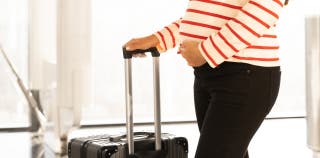
Guide to Traveling While Pregnant: Pregnancy Travel Insurance

10 Romantic Anniversary Getaway Ideas for 2023

Best Travel Insurance for Pre-Existing Medical Conditions April 2024

22 Places to Travel Without a Passport in 2024

Costa Rica Travel Insurance: Requirements, Tips & Safety Info

Best Spain Travel Insurance: Top Plans & Cost

Best Italy Travel Insurance: Plans, Cost, & Tips

Best Travel Insurance for your Vacation to Disney World

Chase Sapphire Travel Insurance Coverage: What To Know & How It Works

2024 Complete Guide to American Express Travel Insurance
Schengen Travel Insurance: Coverage for your Schengen Visa Application

Mexico Travel Insurance: Top Plans in 2024

Best Places to Spend Christmas in Mexico this December

Travel Insurance to Canada: Tips & Quotes for US Visitors
Best Travel Insurance for France Vacations in 2024
Travel Insurance for Germany: Tourist Information & Tips

Best UK Travel Insurance: Coverage Tips & Plans April 2024

Travel Insurance for Trips to the Bahamas: Tips & Safety Info

Europe Travel Insurance: Your Essential Coverage Guide

Best Trip Cancellation Insurance Plans for 2024
What Countries Require Travel Insurance for Entry?

Philippines Travel Insurance: Coverage Requirements & Costs

Travel Insurance for the Dominican Republic: Requirements & Tips
Travel Insurance for Trips Cuba: Tips & Safety Info
AXA Travel Insurance Review April 2024

Travel Insurance for Thailand: US Visitor Requirements & Tips

Travel Insurance for a Trip to Ireland: Compare Plans & Prices

Travel Insurance for a Japan Vacation: Tips & Safety Info

Faye Travel Insurance Review April 2024

Travel Insurance for Brazil: Visitor Tips & Safety Info

Travel Insurance for Bali: US Visitor Requirements & Quotes

Travel Insurance for Turkey: U.S. Visitor Quotes & Requirements

Travel Insurance for India: U.S. Visitor Requirements & Quotes

Generali Travel Insurance Review April 2024

Travelex Travel Insurance Review for 2024

Tin Leg Insurance Review for April 2024

Travel Insured International Review for 2024

Seven Corners Travel Insurance Review April 2024

HTH WorldWide Travel Insurance Review 2024: Is It Worth It?

Medjet Travel Insurance Review 2024: What You Need To Know

Antarctica Travel Insurance: Tips & Requirements for US Visitors

Travel Insurance for Kenya: Recommendations & Requirements

Travel Insurance for Botswana: Compare Your Coverage Options

Travel Insurance for Tanzania: Compare Your Coverage Options

Travel Insurance for an African Safari: Coverage Options & Costs
Nationwide Cruise Insurance Review 2024: Is It Worth It?
- Travel Insurance
- Travel Insurance for Seniors
- Cheap Travel Insurance
- Cancel for Any Reason Travel Insurance
- Travel Health Insurance
- How Much is Travel Insurance?
- Is Flight Insurance Worth It?
- Anniversary Trip Ideas
- Travel Insurance for Pre-Existing Conditions
- Places to Travel Without a Passport
- Christmas In Mexico
- Europe Travel Insurance
- Compulsory Insurance Destinations
- Philippines Travel Insurance
- Dominican Republic Travel Insurance
- Cuba Travel Insurance
- AXA Travel Insurance Review
- Travel Insurance for Thailand
- Ireland Travel Insurance
- Japan Travel Insurance
- Faye Travel Insurance Review
- Brazil Travel Insurance
- Travel Insurance Bali
- Travel Insurance Turkey
- India Travel Insurance
- Generali Travel Insurance Review
- Travelex Travel Insurance Review
- Tin Leg Travel Insurance Review
- Travel Insured International Travel Insurance Review
- Seven Corners Travel Insurance Review
- HTH WorldWide Travel Insurance Review
- Medjet Travel Insurance Review
- Antarctica Travel Insurance
- Kenya Travel Insurance
- Botswana Travel Insurance
- Tanzania Travel Insurance
- Safari Travel Insurance
- Nationwide Cruise Insurance Review
Policy Details
LA Times Compare is committed to helping you compare products and services in a safe and helpful manner. It’s our goal to help you make sound financial decisions and choose financial products with confidence. Although we don’t feature all of the products and services available on the market, we are confident in our ability to sound advice and guidance.
We work to ensure that the information and advice we offer on our website is objective, unbiased, verifiable, easy to understand for all audiences, and free of charge to our users.
We are able to offer this and our services thanks to partners that compensate us. This may affect which products we write about as well as where and how product offers appear on our website – such as the order in which they appear. This does not affect our ability to offer unbiased reviews and information about these products and all partner offers are clearly marked. Given our collaboration with top providers, it’s important to note that our partners are not involved in deciding the order in which brands and products appear. We leave this to our editorial team who reviews and rates each product independently.
At LA Times Compare, our mission is to help our readers reach their financial goals by making smarter choices. As such, we follow stringent editorial guidelines to ensure we offer accurate, fact-checked and unbiased information that aligns with the needs of the Los Angeles Times audience. Learn how we are compensated by our partners.
- United States
- United Kingdom
Travel insurance for visitors to Australia
You can get travel insurance from an australian provider if you are planning to visit the country. it can cover medical expenses, cancellations, lost luggage and more..
In this guide
Compare policies for visitors to Australia
What is travel insurance for overseas visitors to australia, what does travel insurance for overseas visitors cover, other insurance options for visitors to australia, conditions of non-resident travel insurance for australia, questions about travel insurance for visitors to australia.
Destinations
What you need to know
- If you are coming to Australia, a handful of providers offer inbound travel insurance policies .
- You can take out policies for family members coming to Australia as well.
- Travel insurance can cover things like medical expenses, flight cancellations and personal liability – it is not the same as OVHC.
*When looking for cover, make sure to read any guidelines in the PDS to ensure you qualify for the policy. Most insurers have limitations when it comes to covering pre-existing medical conditions for visitors to Australia. Note: This information was last updated August 2023
Travel insurance for overseas visitors, sometimes called inbound travel insurance, is for non-Australian residents who plan to travel to Australia.
For example, if you are currently in the Phillipines and want cover for when you are in Australia, including the inbound flight, this type of policy can cover you. It can also cover family members – for example, if you're currently living in Australia and want to cover a family member travelling to see you.
Inbound travel insurance is not the same as Overseas Visitor Health Cover . This is a type of health insurance you often need if you are coming to work in Australia on a visa.
Can non-residents get regular travel insurance?
If you don't live in Australia, you will need to get inbound travel insurance – it's a type of policy designed for non-residents. However, if you're a temporary or permanent resident in Australia, you should be able to get regular travel insurance. I was able to do this as temporary resident when I first moved to Australia from Scotland.
Gary Ross Hunter Finder's insurance and innovations editor
Travel insurance for overseas visitors includes similar benefits to international travel insurance policies, such as:
- Medical care. Cover if you need medical care while you're in Australia. Emergencies are often unexpected and expensive, so don't let you or your family get caught out.
- Interruption. Sometimes, unforeseen circumstances force you to cancel or cut your trip short. Whether you lose your job or are diagnosed with an illness, the long journey means that flights to Australia can be pretty expensive. Travel insurance policies reimburse you for the money you are otherwise not able to get back.
- Belongings. You're travelling such a long way so the last thing you want is to be stuck in Australia without your luggage. If your luggage and belongings are lost, stolen or damaged on your trip, your insurance policy will provide cover for the cost of their repair or replacement. Similarly, if an airline misplaces your luggage or it is delayed, cover is available to help you buy essential clothing and toiletries.
- Theft. Australia is a generally safe country but theft can occur anywhere, especially if you're planning on exploring different parts of the country. Travel insurance looks after you if your cash, credit cards, passport or important travel documents are stolen.
- Accidents. If you're planning a road trip, rental vehicle excess cover makes sure you don't have to pay the excess on the rental vehicle if something goes wrong. Travel insurance for visitors to Australia can also include personal liability . If an accident occurs and you are legally liable to pay for the costs, this can reimburse you up to the limit specified on your policy.
- Travel insurance for overseas students
- Inbound travel insurance
- Long term visitors
- Health insurance for Australian visa holders
Typical conditions and eligibilty requirements for non-resident travel insurance include:
- Most of your time must be spent in Australia. You can travel to other destinations for a short time but most of your trip must be spent in Australia.
- Pre-existing conditions. Not all pre-existing medical conditions will be covered by insurers. Some may be automatically excluded and for others, you may be required to submit further information detailing the nature of your condition.
- Age limits. Non-resident travel insurance will generally have an age limit on people who can take out cover. For example, many policies stop offering cover if you are under the age of 80.
Get a free travel insurance quote
Why you can trust Finder's travel insurance experts

We're experts

We're independent

We're here to help
What is the best travel insurance for visitors to australia.
The best travel insurance for visitors to Australia depends on your needs. However, you will probably need inbound travel insurance because this covers non-residents travelling to Australia for a short stay. If you live and reside in Australia – for example, you're on a visa, you should be eligible for any type of travel insurance.
Is it possible to purchase a travel insurance policy once you're already in Australia?
Yes, it is. You can purchase cover before you leave home or once you arrive in Australia. If you purchase cover when you're already in Australia, you may have to serve a brief waiting period (commonly 48 hours) before certain aspects of the cover will take effect.
Will my children be covered?
Most non-resident travel insurance policies can also cover your dependent children, often for no additional charge.
When can I buy a policy?
You can buy a policy online as soon as you book your trip. If you forget to get cover and have already arrived in Australia, some insurers will still let you buy a policy if you buy it within a few days of arrival.
Will I be covered for trips outside of Australia?
There are some insurers who will cover you for trips outside of Australia but the majority of your time must be spent in Australia.

Gary Ross Hunter
Gary Ross Hunter is an editor at Finder, specialising in insurance. He’s been writing about life, travel, home, car, pet and health insurance for over 6 years and regularly appears as an insurance expert in publications including The Sydney Morning Herald, The Guardian and news.com.au. Gary holds a Kaplan Tier 2 General Advice General Insurance certification which meets the requirements of ASIC Regulatory Guide 146 (RG146).
More guides on Finder
Find out what inbound travel insurance covers and compare policies to find the right cover option.
Is travel insurance really necessary when you’re coming here on a visa? The answer is "yes" and this guide looks at what you need and why you need it when travelling to Australia on a 457 visa.
Are you a non-resident living in Australia and wanting to travel overseas? Don't fret – you can still get travel insurance.
How likely would you be to recommend finder to a friend or colleague?
Our goal is to create the best possible product, and your thoughts, ideas and suggestions play a major role in helping us identify opportunities to improve.
Important information about this website
Advertiser disclosure.
finder.com.au is one of Australia's leading comparison websites. We are committed to our readers and stands by our editorial principles
We try to take an open and transparent approach and provide a broad-based comparison service. However, you should be aware that while we are an independently owned service, our comparison service does not include all providers or all products available in the market.
Some product issuers may provide products or offer services through multiple brands, associated companies or different labeling arrangements. This can make it difficult for consumers to compare alternatives or identify the companies behind the products. However, we aim to provide information to enable consumers to understand these issues.
How we make money
We make money by featuring products on our site. Compensation received from the providers featured on our site can influence which products we write about as well as where and how products appear on our page, but the order or placement of these products does not influence our assessment or opinions of them, nor is it an endorsement or recommendation for them.
Products marked as 'Top Pick', 'Promoted' or 'Advertisement' are prominently displayed either as a result of a commercial advertising arrangement or to highlight a particular product, provider or feature. Finder may receive remuneration from the Provider if you click on the related link, purchase or enquire about the product. Finder's decision to show a 'promoted' product is neither a recommendation that the product is appropriate for you nor an indication that the product is the best in its category. We encourage you to use the tools and information we provide to compare your options.
Where our site links to particular products or displays 'Go to site' buttons, we may receive a commission, referral fee or payment when you click on those buttons or apply for a product. You can learn more about how we make money .
Sorting and Ranking Products
When products are grouped in a table or list, the order in which they are initially sorted may be influenced by a range of factors including price, fees and discounts; commercial partnerships; product features; and brand popularity. We provide tools so you can sort and filter these lists to highlight features that matter to you.
Terms of Service and Privacy Policy
Please read our website terms of use and privacy policy for more information about our services and our approach to privacy.
- Credit cards
- View all credit cards
- Banking guide
- Loans guide
- Insurance guide
- Personal finance
- View all personal finance
- Small business
- Small business guide
- View all taxes
Visiting Australia? Consider Travel Insurance

Many or all of the products featured here are from our partners who compensate us. This influences which products we write about and where and how the product appears on a page. However, this does not influence our evaluations. Our opinions are our own. Here is a list of our partners and here's how we make money .
Table of Contents
Different types of travel insurance
Do you need travel insurance for australia, which credit cards offer australia travel insurance, other ways to get travel insurance, if you want to get travel insurance for australia.
Now open to tourists after two years of pandemic-related closures, Australia is back on many travelers’ wish lists, and for good reason. Whether you’re interested in surfing on the Gold Coast, taking a road trip through the Outback or diving along the Great Barrier Reef, there are a lot of options to consider. But with so many adventurous — and potentially dangerous — activities, you may also want to think about purchasing travel insurance.
Let’s take a look at the different types of travel insurance for Australia, which credit cards provide complimentary coverage and other ways you can acquire insurance for added peace of mind.
A must-have for many, travel insurance can help cover unexpected costs related to travel mishaps, medical incidents or evacuations. However, not all travel insurance is created equal. There are a variety of types available for every kind of situation, and you’ll need to do some research to understand what’s worth purchasing and what might not be necessary.
Here are some common types of travel insurance:
Trip cancellation insurance . Used to recoup costs when you cancel a trip due to something unanticipated, like a medical issue.
Trip interruption insurance . Reimburses you for travel costs when you need to cut a trip short and return home unexpectedly.
Baggage loss insurance . Provides reimbursement when your baggage is lost, damaged or stolen.
Emergency evacuation insurance . Covers costs related to evacuating you to a different location, either for medical or safety reasons.
Travel medical insurance . Used to cover medical costs while traveling, either as a primary or secondary insurer, depending on the type of coverage you purchase.
Cancel for Any Reason insurance . A supplemental insurance that provides partial reimbursement of nonrefundable travel costs when you cancel a trip for any reason.
Rental car insurance . Covers costs related to damage or repair of a rental vehicle. This can be especially useful when renting a car in another country.
Accidental death insurance. Similar to life insurance, this coverage provides payment to a person of your choosing in case of death while you’re traveling.
You may also want to consider finding insurance that covers COVID quarantine costs. Not all policies include this coverage, so you’ll want to be sure it’s included if it’s important to you.
» Learn more: The best travel insurance companies, according to Nerds
While it’s not required for entry, it may be a good idea. Travel insurance can come in useful just about anywhere, especially because it’s difficult to anticipate things like travel delays and accidents.
If you’re fairly confident about your travel plans, you may be comfortable with the insurance provided by your credit cards, though be aware that they may have lower limits than you’d like.
Otherwise, purchasing a travel insurance policy is always an option. Keep in mind that rates will vary according to your travel destination, dates of travel, ages and total trip cost.
» Learn more: What you need to know before shopping for travel insurance
Even if you’ve decided not to buy travel insurance, you may already have some coverage. Plenty of travel cards include some form of complimentary travel insurance, though the types — and limits — you receive will vary depending on which card you hold.
Many Chase credit cards offer primary rental car insurance, which will cover you in the event of an accident without needing to involve your personal auto insurance company. You’ll need to decline the rental car company’s coverage and pay with your eligible Chase card .
You can find trip delay insurance, emergency medical evacuation, lost baggage coverage and more among the different protections offered by these cards. Here are some of the more common travel cards that provide complimentary travel insurance.
Chase Sapphire Preferred® Card .
Chase Sapphire Reserve® .
The Platinum Card® from American Express . Terms apply.
Capital One Venture X Rewards Credit Card . (Benefits may change over time.)
United℠ Explorer Card .
You’ll want to read each card’s benefits guide very carefully before deciding which card to use. For example, both the The Platinum Card® from American Express and the Chase Sapphire Reserve® offer lost luggage insurance. Terms apply.
However, insurance from the The Platinum Card® from American Express only applies in the event that you’ve either paid for the full fare with your AmEx card or have redeemed your AmEx points for the flight. Using your card to pay the taxes and fees on an award flight you’ve booked elsewhere — such as redeeming Delta SkyMiles for your flight — does not mean that you’ll receive insurance coverage benefits. Terms apply.
This is in contrast to the Chase Sapphire Reserve® , whose lost luggage benefit is much more generous. In the event that your luggage is lost, you need only have paid the remainder of the charges for the flight after redeeming reward miles, points, coupons or other certificates. This means that charging just the taxes and fees on your card renders you eligible for benefits.
Aside from American Express and Chase cards, you may also want to consider the Capital One Venture X Rewards Credit Card .
Capital One’s offering includes a plethora of travel insurance benefits, including primary rental car insurance, travel accident insurance, trip cancellation and interruption insurance, lost luggage reimbursement, trip delay reimbursement, travel and emergency assistive services and more. Of course, in order to qualify for these benefits, you’ll need to have charged the trip to your card. Benefits may change over time.
» Learn more: The best credit cards with travel insurance
Even if your card provides complimentary travel insurance, you may also want to consider acquiring an additional policy — especially if you’re planning on some of the more adventurous activities you’ll find within Australia, such as camping in the Outback.
Health insurance benefits provided by credit cards such as the Chase Sapphire Reserve® max out at relatively low levels, which may mean you end up paying out of pocket in the event of an emergency.
If you’re looking for a supplemental policy, you’ll want to check quotes from a variety of providers. You can do this manually, but websites such as Squaremouth will compare multiple policies at once, making it much easier to peruse offerings. You can also filter your search according to the type of coverage you’d like.
» Learn more: Is travel insurance worth it?
Travel insurance can provide peace of mind to the wary traveler. Whether or not you’re interested in purchasing travel insurance, a variety of credit cards offer complimentary coverage for incidents such as trip delays, emergency medical care, rental car collisions and lost luggage.
Otherwise, you may want to consider buying an additional policy to ensure that you’re covered. If this is what you’re looking to do, make sure to acquire quotes from a variety of providers in order to find the best deal possible.
For Capital One products listed on this page, some of the above benefits are provided by Visa® or Mastercard® and may vary by product. See the respective Guide to Benefits for details, as terms and exclusions apply.
How to maximize your rewards
You want a travel credit card that prioritizes what’s important to you. Here are our picks for the best travel credit cards of 2024 , including those best for:
Flexibility, point transfers and a large bonus: Chase Sapphire Preferred® Card
No annual fee: Bank of America® Travel Rewards credit card
Flat-rate travel rewards: Capital One Venture Rewards Credit Card
Bonus travel rewards and high-end perks: Chase Sapphire Reserve®
Luxury perks: The Platinum Card® from American Express
Business travelers: Ink Business Preferred® Credit Card

on Chase's website
1x-10x Earn 5x total points on flights and 10x total points on hotels and car rentals when you purchase travel through Chase Travel℠ immediately after the first $300 is spent on travel purchases annually. Earn 3x points on other travel and dining & 1 point per $1 spent on all other purchases.
60,000 Earn 60,000 bonus points after you spend $4,000 on purchases in the first 3 months from account opening. That's $900 toward travel when you redeem through Chase Travel℠.

1x-5x 5x on travel purchased through Chase Travel℠, 3x on dining, select streaming services and online groceries, 2x on all other travel purchases, 1x on all other purchases.
60,000 Earn 60,000 bonus points after you spend $4,000 on purchases in the first 3 months from account opening. That's $750 when you redeem through Chase Travel℠.

1x-2x Earn 2X points on Southwest® purchases. Earn 2X points on local transit and commuting, including rideshare. Earn 2X points on internet, cable, and phone services, and select streaming. Earn 1X points on all other purchases.
50,000 Earn 50,000 bonus points after spending $1,000 on purchases in the first 3 months from account opening.


IMAGES
VIDEO
COMMENTS
BestQuote (NZ + AUSTRALIA)works for Australians as it is a premier Canadian travel insurance broker that offers an extensive range of travel insurance options tailored for visitors to Canada. Our plans, which can be obtained either before or after departure, may cover health-related needs, extend up to 24 months, and even include pre-existing ...
A few things that travel insurance for Canada might give you include: Protection against unexpected medical costs. Whether you have a medical emergency or just roll your ankle, your travel insurance policy can help cover your medical costs. Cover for cancellations and delays. Comprehensive travel insurance may reimburse you if you need to ...
In general, travel insurance to Canada costs about 3 - 10% of your total prepaid and non-refundable trip expenses. The cost of travel insurance depends on two factors for AXA Travel Protection plans: Total Trip cost: The total non-prepaid and non-refundable costs you have already paid for your upcoming trip.
Travel insurance can cover you for COVID-19 in Canada. A policy can cover you for the following: Rearrangement costs if you catch the virus and need to change your plans. Lots of comprehensive ...
The rules clearly state that you must have insurance for the full duration of your work permit (e.g. two years). 2. You can't buy a short policy, and then extend it later. Again, the rules are clear: you can't buy a three-month policy and agree to extend it to a two-year policy just to appease the immigration officer.
If you need emergency assistance in Canada, please call our 24/7 emergency medical assistance line on (+) 61 2 8776 3010 or email [email protected] . For non-emergency assistance, you can message our Sydney-based support centre seven days a week . contact us.
Travel Insurance Advice For Canada. Canada has huge appeal for Aussie holidaymakers, with 146,000 visiting in the 12 months before June 2017. 1. Compare Policies. *iSelect does not compare all travel insurers or policies in the market and not all policies or special offers are available at all times or in all areas.
Not all travel insurance policies are the same. Whether you're an avid backpacker or planning your very first overseas getaway, you can find an insurance plan that suits your specific needs. Single-trip insurance. Provides coverage for one trip, from the policy start date to the policy end date. Multi-trip insurance.
Emergency travel assistance. Our Emergency travel assistance team details are: Australia DIRECT and TOLL FREE from: USA 1833 545 3376 Canada 1833 5410 281 UK 0800 072 0091 NZ 0800 451 169. From all other countries or if you experience difficulties with the numbers above: Call direct: +61 2 8907 5201*.
Travel Insurance Direct Pty Limited ABN 30 121 659 470 AR305589 is an authorised representative of nib Travel Services (Australia) Pty Ltd (nib) ABN 81 115 932 173, AFS Licence No. 308461 and act as nib's agent and not as your agent.
A Canada travel insurance policy will typically offer: Medical cover - healthcare abroad can be expensive, so travel insurance for Canada is a must. This can cover you for repatriation back to the UK, as well as emergency treatment. As you're travelling outside of Europe, look for a cover limit of at least £5 million.
Compare travel insurance quotes to find the best deals in Australia. Our free service can help you save time, worry & loads of money. Compare over 200 policies in seconds with Australia's travel insurance experts.
If you're going to Canada on an IEC Visa, you'll need travel insurance which satisfies the requirements of the Canadian Immigrations authorities, and which you can extend as well if you need to. True Traveller Insurance has many benefits over some other policies, including: Medical and Repatriation cover of up to £10M (€10M for residents ...
Australian travellers lodged almost 300,000 insurance claims in 2018-19, the last financial year before COVID-19 travel bans. Almost 90% of those were paid out. Top four reasons for declined claims. Due to policy exclusions, or not included in the policy conditions. Claim amount was below the excess.
Allianz Travel Insurance can cover costs like travel delays or emergency medical treatment, or the cost of replacing items that were lost or stolen during your trip. 1. We have Basic, Comprehensive, Domestic, and Multi-Trip Plans to choose from, with varying levels of cover to help you when you need it most. Our plans are available for singles ...
Canadians are optimistic about travel in 2024. The cost of travel is on the rise, but that isn't stopping most Canadians from planning a vacation. According to a new study from Blue Cross, Canadians spent an average of $4,200 on their last vacation, and 94 per cent feel the cost of travelling is increasing. However, the 2024 Blue Cross Travel ...
Find out about cover Tick Travel Insurance provides, how it rates for customer service and the pros and cons of its offering. ... Canada. Australia. Italy. ADVISOR. ... Tick Insurance Australia ...
When traveling abroad, look for a policy with a short waiting period. The most generous travel plans provide $2,000 in trip delay benefits, per person, but you can buy policies with less if you ...
In certain areas, sharks, crocodiles, jellyfish and other wildlife pose a risk to swimmers. Avoid unsupervised beaches. Follow the instructions and warnings of lifeguards. Respect the flag warning system, which provides notice of water conditions and safety risks on beaches. Beach safety - Government of Australia.
Canada travel insurance for Australia typically covers medical expenses, emergency medical evacuation, trip cancellation or interruption, baggage loss or delay, travel delays, and personal liability. However, the coverage will vary depending on the specific insurance plan you choose. It is very useful to make an informed decision by comparing ...
There are two main types of travel insurance you can buy from World Nomads for trips to Australia: the Standard and Explorer plans. We recommend the Explorer plan due to its higher levels of ...
Age: 35 years old. Destination: Australia. Trip Length: 7 days. Trip cost: $2,000. You can see our quotes for basic travel insurance in the following table. The cheapest travel insurance plan ...
Travel insurance for overseas visitors includes similar benefits to international travel insurance policies, such as: Medical care. Cover if you need medical care while you're in Australia.
Here are some common types of travel insurance: Trip cancellation insurance. Used to recoup costs when you cancel a trip due to something unanticipated, like a medical issue. Trip interruption ...